 10/08/2009 02:24 10/08/2009 02:24 |
|
| | | OFFLINE | | Post: 18.134
Post: 793 | Registrato il: 28/08/2005
Registrato il: 20/01/2009 | Administratore | Utente Senior | |
|
 In the preceding page is an article on Mons. Ranjith's installation as Archbishop of Colombo and an interview he gave to Avvenire before he left Rome.
COMING HOME TO COLOMBO
In the preceding page is an article on Mons. Ranjith's installation as Archbishop of Colombo and an interview he gave to Avvenire before he left Rome.
COMING HOME TO COLOMBO
On the website of the Archdiocese of Colombo, I found a number of pictures taken upon the arrival of Mons. Ranjith in Colombo on 7/31/09, and I thought I would post some of them here, because it was apparently a big local event - doubly significant and remarkable because Sri Lanka is predominantly Buddhist.
And yet, Archbishop Ranjith got the works - an airport news conference, Vatican flags alternating with the national flag along the way, streamers to welcome him, flag-waving crowds. (Not even in my country, the Philippines - at least 80% Catholic and Asia's most Catholic country - did we put on such a show to welcome home any of our three bishops who became cardinals after they got back from their respective consistories.]
It's a testimony to what he said in the earlier interview about the important role that the Catholic Church is perceived to have in Sri Lanka.
The first person to welcome Mons. Ranjith home is his predecessor, Mons. Oswald Gomis.
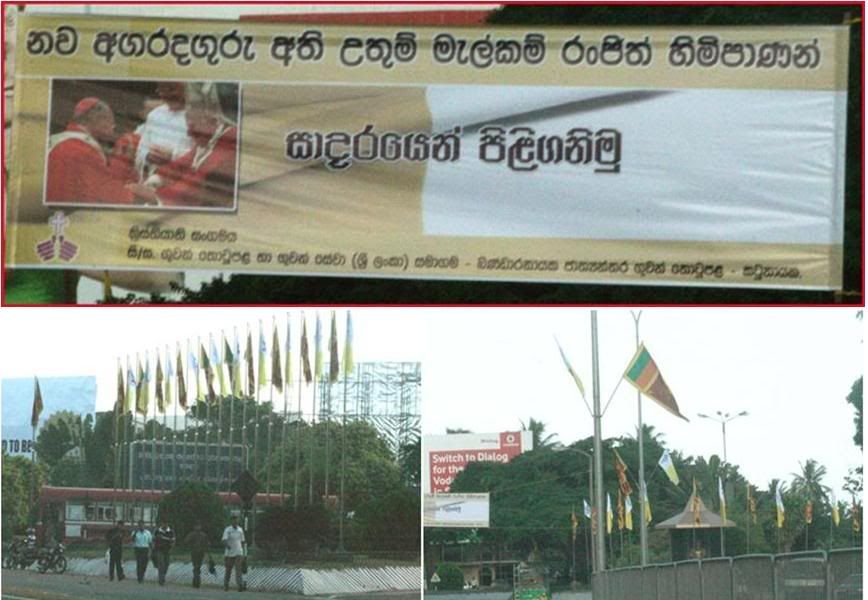
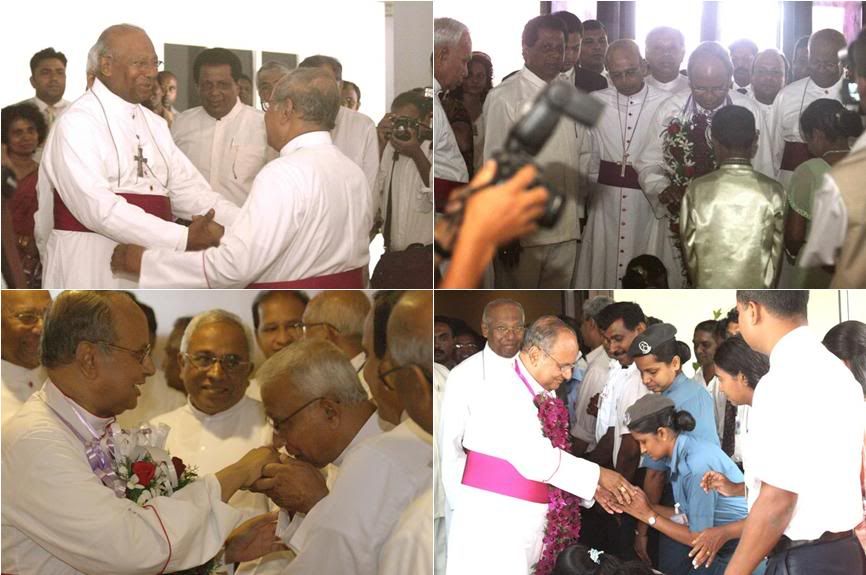
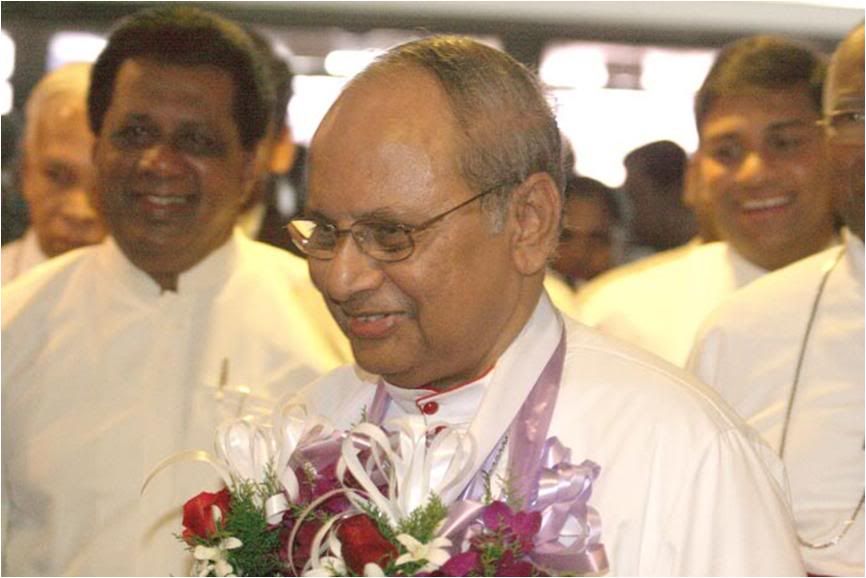
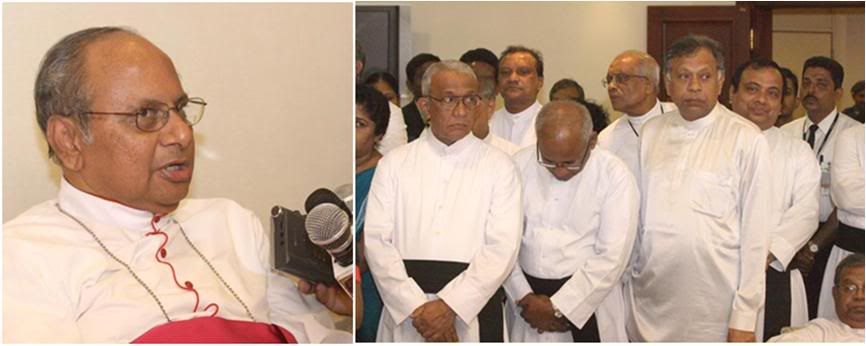

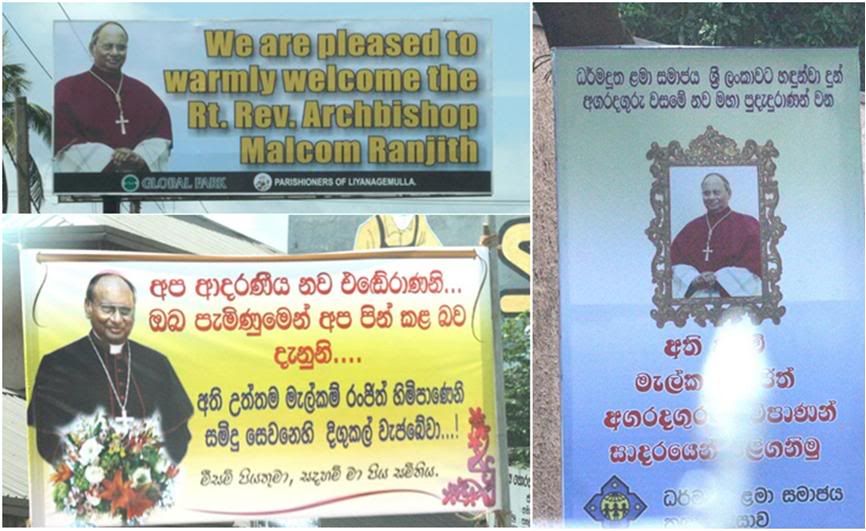
 Another item of interest from the diocesan site is a 2006 interview with Mons. Ranith by 30 GIORNI a few months after he was called to Rome by Pope Benedict XVI to serve at the CDW. It's a lengthy one, but I will post the part where he talks about his relations with Cardinal Ratzinger then Pope Benedict, and about the liturgy; and later, where he talks about what he did during the Dec. 2005 tsunami (he was the Nuncio in Jakarta, and he happened to have Cardinal Schoenborn as his house guest at the time, and they both ended up helping mobilize international Catholic adi from Bandar Aceh.)
Interview with Mons. Ranjith
Another item of interest from the diocesan site is a 2006 interview with Mons. Ranith by 30 GIORNI a few months after he was called to Rome by Pope Benedict XVI to serve at the CDW. It's a lengthy one, but I will post the part where he talks about his relations with Cardinal Ratzinger then Pope Benedict, and about the liturgy; and later, where he talks about what he did during the Dec. 2005 tsunami (he was the Nuncio in Jakarta, and he happened to have Cardinal Schoenborn as his house guest at the time, and they both ended up helping mobilize international Catholic adi from Bandar Aceh.)
Interview with Mons. Ranjith
by GINNI CARDINALE
Translated from

'''
How did you meet Cardinal Joseph Ratzinger?
In connection with a question concerning Sri Lanka, that of the theologian Fr.Tissa Balasuriya, who had written a book, Mary and Human Liberation, which contained a theological analysis hardly compatible with Catholic doctrine.
I was a young bishop then, just appointed. I took an interest in the book and an episcopal commission specially created to scrutinize the text was set up by the Bishops. In 1994, at the conclusion of the Commission’s work, the Bishops’ Conference released a communiqué in which the faithful were told that the book did not mirror the doctrine of the Church. This communiqué provoked a worldwide press campaign against us and in favor of Father Balasuriya.
The controversy was so loud that Rome also began to investigate. And so I was summoned to the Vatican to explain what was happening to the Pope and to the Prefect of the Congregation for the Doctrine of the Faith, Cardinal Ratzinger.
Father Balasuriya’s errors were so serious that in January 1997 they were formally condemned by the Congregation, and he himself, since he wouldn’t withdraw them, suffered excommunication latae sententiae. An excommunication that was withdrawn the following year, after a solemn public declaration by Father Balasuriya.
So it was in that context that your acquaintance with Cardinal Ratzinger began
Yes, and subsequently, I met him several times. On those occasions I had the chance to tell him of my impressions and my concerns as bishop especially with regard to the question of inter-religious dialogue and also liturgical questions.
When I was later called to Propaganda Fide [the Congregation for the Evangelization of Peoples, to which John Paul II named him secretary], I had the opportunity of meeting Cardinal Ratzinger more frequently, even for the everyday business of the dicastery, to which he also belonged.
So, apart from being an avid reader of his books, I learned in person to esteem his human gifts. I’ve always seen a great theologian in him and in his words, not a pedant at all, but a person close to the Lord.
So you were in Jakarta [as Apostolic Nuncio - his assignment after Propaganda Fide] a little less than two years. On 10 December 2005, your nomination as Secretary of Divine Worship was made known. Were you expecting the new call to Rome?
I remember that Benedict XVI summoned me to an audience in Castel Gandolfo during the summer of 2005, it was mid September, and he asked me whether I would accept to be the secretary of the Congregation for Divine Worship. It was his request and so I said yes.
I’ve always had an interest in the liturgy, which I’ve considered the key to understanding the relationship between faith and life, because I believe that as the liturgy is celebrated, so the Christian faith is lived.
On the one hand, the liturgy externalizes faith; on the other, it feeds it. To be able to offer my modest contribution on this point, which is something close to the heart of Pope Benedict, has filled my heart with joy.
Your Excellency, your first public utterance as Secretary of the Congregation for the Divine Worship was a speech in April 2006 at the launching of the book by Uwe Michael Lang, an Oratorian of German origin who lives in London [Last year, the Holy Fahter asked Fr, Lang to come to Rome to work in teh CDW]. The book is Rivolti al Signore. L’orientamento nella preghiera liturgica [Turned to the Lord. Orientation in liturgical prayer] (Cantagalli, Siena 2006, pp. 150, Euro 14.90). First published in German in 2003, it has a preface by the then Cardinal Joseph Ratzinger. What struck you most about the book?
I had already read the book and the very fine preface by the then Cardinal Ratzinger. Then when I received the invitation, I immediately accepted. Because it was the occasion to create a very positive debate within the Church.
There’s a lot of talk about the participation of the faithful in the liturgy.
But do the faithful participate more if the priest celebrates versus populum or if he celebrates toward the altar? It’s not at all certain that participation is more active if the priest celebrates toward the people; it may be that people become more distracted.
Is it real participation when, at the sign of peace, a great confusion is created in the church, with some priests at times going down to give their greetings even to those in the rear pews?
Is it actuosa participatio, as intended by the Second Vatican Council, or simply a big distraction that doesn’t help at all in creating the sense of meditation and devotion necessary for the moment of communion. Besides, at times even the recitation of the Agnus Dei is forgotten…
I repeat, Father Lang’s book has been and is a most useful provocation, starting from the introduction in which Cardinal Ratzinger reminds us that the Council never asked for the abolition of Latin nor the revolutionizing of the direction of liturgical prayer…
An interview of yours in La Croix of 25 June 2006, entitled 'The liturgical reform of Vatican II has never taken off', attracted a lot of attention. Can you clarify your views on the liturgical reform put into effect after Vatican Council II?
Those words have been taken out of context. It isn’t that I judge negatively everything has happened after the Council. I said instead that the results expected from liturgical reform are still not manifest.
One wonders whether liturgical life, the participation of the faithful in sacred functions, is greater and better today compared to that of the 1950s.
There has been criticism of the fact that before the Council the faithful didn’t really participate in the Mass, but were passively present or engaged in personal devotions. But do the faithful today really participate in a more spiritually elevated and personal way?
Did the many who had left the Church start queuing up to get into our churches when the new liturgy was introduced? Or hasn’t it happened instead that many more have stopped going to Mass and that the churches have emptied? What reform are we talking about therefore?
The result of secularization?
Certainly, but the situation is also the outcome of the way in which the liturgy has been treated or, rather, mistreated … In practice, I think the sacrosanct expectations of the Council for a better understood and therefore more spiritually fecund liturgy have still not been realized. And so there is still much to do, so that the churches may fill up again with new faithful who really feel touched by the grace of the Lord during the sacred liturgies.
In a secularized world, instead of seeking to raise hearts toward the greatness of the Lord, the effort has been to reduce the divine mysteries to a trivial level.
When you were nominated secretary of Divine Worship, it was expected that you would have excellent relations with the Lefebvrian world. Is that so ?
I never met Monsignor Marcel Lefebvre because of the age difference - he belonged to another era. I certainly have had contact with some of his followers. But I’m not a fan of the Lefebvrians. Unfortunately they still haven’t re-entered into full communion with the Holy See, but what they sometimes say about the liturgy, they say for good reason. And therefore they’re a goad that should make us reflect on what we’re doing.
That doesn’t mean that I can be described as an adherent or a friend of the Lefebvrians. I share some points with the so-called No-globals on social justice, but that doesn’t mean I’m one of their adherents
On the other hand the Tridentine mass is not the private property of the Lefebvrians. It is a treasure of the Church and of us all. As the Pope told the Roman Curia last year, Vatican Council II was not a break, but a renewal in continuity. One does not throw away the past, but one grows on it.
...
About the tsunami:
It was precisely during your stay in Jakarta that Southeast Asia was hit by the terrible tsunami. What was that experience like?
The archbishop of Vienna, Cardinal Christoph Schönborn, a dear friend of mine, was staying with me at the time. When we heard of the tragedy, we abandoned the program already arranged for him and we went to Banda Aceh.
It was an extremely difficult journey, but we managed to arrive and visit the stricken areas. It was a terrible spectacle: death and destruction everywhere. We spent two days with missionaries, we slept where we could, without running water and without electricity.
But we were content to be near the small Catholic community of Banda Aceh and also of the island of Nias. The voice of Cardinal Schönborn speaking on the European media from the area and telling of his experience was also decisive for the solidarity shown from all over the world.
Later through the Caritas network and the help of the Holy See we managed to set up a solid aid program for the people. The Indonesian Caritas was inactive, and so with the help of the Cardinal Archbishop of Jakarta and of Caritas Internationalis we managed to reactivate that ecclesial body and to set up aid projects for the rebuilding of those areas.
I remember that we took part in endless but important meetings with civilian authorities, thanks to which we were able to make our contribution as Catholic Church to the people stricken by this monstrous tragedy.
Mons. Ranjith gave this interview in 2006. I wonder if he saw the Mahony-like circus Mass that his good friend Cardinal Schoenborn celebrated in Vienna two years later - and what would he have said to him?
[Modificato da TERESA BENEDETTA 10/08/2009 02:58] |
| |
|
| |
 11/08/2009 14:47 11/08/2009 14:47 |
|
| | | OFFLINE | | Post: 18.146
Post: 805 | Registrato il: 28/08/2005
Registrato il: 20/01/2009 | Administratore | Utente Senior | |
|
 Here's a great enterprise story by the enterprising editors of NLM - a revelation to most us, really, who had not even been aware there was such a position as this at St. Peter's.
Here's a great enterprise story by the enterprising editors of NLM - a revelation to most us, really, who had not even been aware there was such a position as this at St. Peter's.
From Sandro Magister's articles on the topic, it seemed that whoever was director of the Sistine Chapel Choir also had the musical direction for liturgies at St. Peter's. Happily, Benedict XVI apparently went about that touchy problem with this evidently felicitous appointment.
Music at St. Peter's:
The transformation -
and the man responsible for it
by Jeffrey Tucker

August 10, 2009
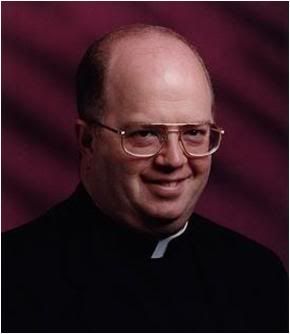
It was my pleasure to enjoy a long chat with Fr. Pierre Paul, director of music at St. Peter's Basilica in Rome. He has held this position since 2008, having been director at the North American College.
After leaving that position, he came back to home in Trois-Rivières, Quebec, only to be called back to head the music program at St. Peter's under the guidance of Benedict XVI.
Since then, he has embarked on a spectacular program that amounts to the musical application of the principle of the hermeneutic of continuity. What was holy then is holy now.
He has infused the entire program at the Vatican with a new love of excellence and idealism by embracing the program legislated by the Second Vatican Council, taking seriously the call for Gregorian chant to assume the primary role in liturgy.
This has meant, in the first instance, and above all else, using Gregorian ordinary settings for all Masses. For ordinary time, he is using Mass XI or Obis Factor. For Advent and Lent he is using Mass XVII (Kyrie Salve), switching out the Kyrie for respective seasons.
For Easter, he chooses Mass I (Lux et Origo), along with Mass IV (Cunctipotens Genior Deus) for the Feast of the Apostles. He also uses Credo I, III, and IV, and, periodically, the whole of Mass IX (Cum Jubilo). He is trying minimize the use of Mass of the Angels, though it is still programmed for large international Masses since this is the one that most people know.
These are all huge advances, and he is thrilled to hear that people are singing with gusto! Actually, people are singing as never before. He is careful to print large booklets for every Mass with translations.
He is dedicated to making sure that he does not use modern notation in the booklets. He believes in neumes, the notation of the Church, because he regards them as easier to sing than modern notes and because they convey the sense that the music of the Church is different from other forms of music
The biggest advances have been made in the area of propers, which had long been displaced by hymns that are extraneous to the Mass. The Introit of the day is sung at every Mass as the celebrant approaches the altar, following a hymn or organ solo. The communion chant is always sung with Psalms from Richard Rice's editions posted at MusicaSacra.com.
This is a major step and a restoration of a very early practice for Papal Masses. The offertory antiphon is also sung periodically and increasingly so, as more and more singers can handle the material.
For the Psalm, St. Peters is alternating the use the of the Gradual Psalm from the Graduale Romanum and the simpler Psalms from the Graduale Simplex.
Just now, the choirs are moving into the polyphonic repertoire of the Italian masters such as Palestrina and Victoria, and will be increasingly exploring polyphonic propers along with new compositions.
Other major changes made by Fr. Paul include instituting rehearsals on Wednesday nights. Yes, you read that right. The choir didn't used to rehearse. Now they do.
What's more, he invites Dom Saulnier from Solesmes, now living in Rome and teaching at the Pontifical Institute for Sacred Music, to teach weekly chant training seminars. This is a complete switch from the past.
The new closeness between Solesmes and St. Peters will intensify later this year when Solesmes releases an in-print version of the first volume of the Antiphonale for the Liturgy of the Hours, which will then be used in published form for Vespers at the Vatican.
Fr. Paul has instituted new standards for visiting choirs. As he says, "it cannot be just any choir. It must be a liturgical choir." This means the he listens to recordings of their work before any guest choir sings at St. Peters.
They must clear the repertoire in advance. And whatever they sing must fit in with the musical structure as it is developing at St. Peters. So if there is a motet to sing, it can only be sung following the propers of the Mass.
This change has made a huge difference in not only advancing the music in the Vatican but in encouraging the right trends in all parts of the world. It is an honor to sing at St. Peter's, and Fr. Paul's work to raise the standards are having an effect.
Several aspects of this extended talk surprised me. One was how much time Fr. Paul spends doing programs. He is constantly online download material, scanning material, and dragging and dropping graphics and worrying about things like image resolution and spacing. He has nowhere near the level of help one might expect. In other words, his job is pretty much like that of every parish musician.
Another surprise to me is how he, in an entirely humble way, seems not entirely sure about the influence of what he is doing at St. Peter's and what the long-term implications are.
But of course the truth is that what happens here serves as a model for parishes and cathedrals around the world. The trends at the Vatican eventually come to pervade the whole Church, and this is where his long-term influence is going to be felt most profoundly.
Essentially, what he is doing is progressing toward a unity of the present with the past heritage of Catholic music, preserving while re-invigorating, and innovating toward the restoration of an ideal.
For his wonderful work in this area, all Catholics the world over are very much in debt to Fr. Paul!
There are surely bumps along with the way and some opposition to deal with, though Fr. Paul doesn't speak about these aspects. For his part, what inspires him is that it is a well-known fact that the Pope himself is thrilled with the great progress he is making and can't be happier about the direction of change.
He works every harder toward the goal, hardly ever going to sleep before midnight and then rising at the crack of dawn to work some more.
The singers are excited by the new emphasis on excellence above all else, and are willing to work harder than ever. They are coming to rehearsal ready to sing and happy for the privilege of doing what they are doing. The same is true of the cantors, who are given new responsibilities and are held to higher standards.
The glorious thing that is happening here comes down to this: the program is giving back to Catholic their native music and freeing up the universal musical voice of the faith. This amounts to a major step toward the unity of the faith all over the world.
Nothing could be more essential in a secular culture defined by its aesthetic fracturing. We need this major step to help us pray together and come together in one faith. He is not only a humble visionary but a man of great courage with an eye to the future of sacred music.
[Modificato da TERESA BENEDETTA 10/12/2009 20:00] |
| |
 14/08/2009 22:56 14/08/2009 22:56 |
|
| | | OFFLINE | | Post: 18.166
Post: 824 | Registrato il: 28/08/2005
Registrato il: 20/01/2009 | Administratore | Utente Senior | |
|
 BROTHER GEORG MAKES
BROTHER GEORG MAKES
A DAY TRIP TO ANAGNI
By PIERO CARNEVALE
Translated from

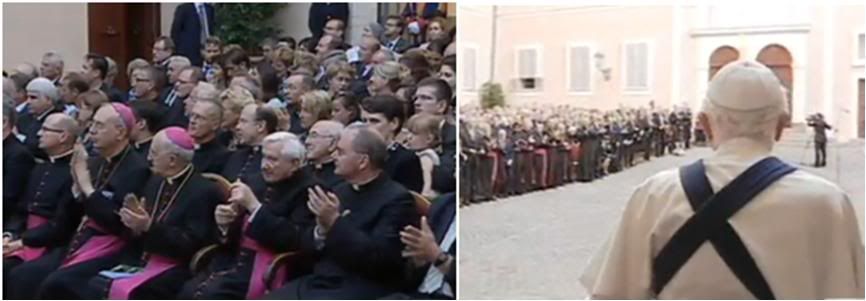
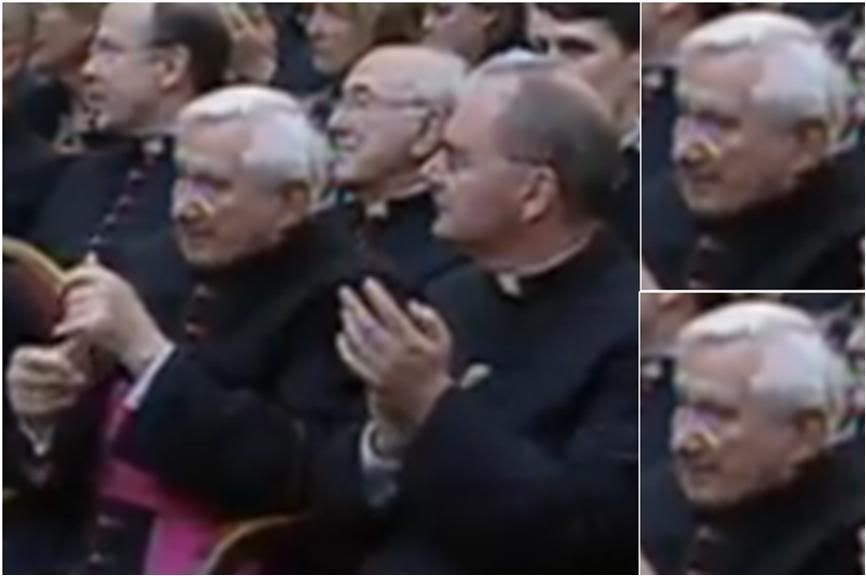 Since he arrived in Castel Gandolfo two weeks ago, the only picture I have seen of Mons. Ratzinger was a brief shot from a Rome Reports videoclip of the chamber orchestra concert in Castel Gandolfo on August 2.
Since he arrived in Castel Gandolfo two weeks ago, the only picture I have seen of Mons. Ratzinger was a brief shot from a Rome Reports videoclip of the chamber orchestra concert in Castel Gandolfo on August 2.
ANAGNI, August 14 - A private visit away from the glare of publicity and news cameras - to enjoy in peace the treasures of the cathedral and its crypt, and to speak with the bishop of this ancient town also known as 'the city of popes' because it gave birth to four Popes.
Anagni traces its history to 700,000 years B.C. and survives as a walled medieval town with well-preserved buildings and many art treasures. It is 65 kms. east-southeast of Rome and some 40 kms east of Castel Gandolfo.
Shortly after 9:30 yesterday morning, Mons. Georg Ratzinger, older brother of Pope Benedict XVI, arrived in Anagni for a private visit. As has become customary since his brother became Pope, Mons. Ratzinger, 85, spends the month of August with his brother in the papal residence of Castel Gandolfo. It was one of his rare solo outings.
"it was really a lightning visit, a bit over an hour in the Cathedral," said Mons. Lorenzo Loppa, Bishop of Anangi-Alatri. "He said he had always wanted dto see our cathedral [dedicated to Santa Maria Annunziata, the Lady of the Annunciation], particularly its crypt. He expressed his appreciation and wonder, much more than the usual tourists when confronted with such beauty."
After the visit to the Cathedral, he also visited the diocesan seminary and then met briefly with the Mayor of Anagni, Carlo Noto.
"I found him to be a truly beautiful person," said Mons. Loppa, "A very simple and kindly man."
Despite the short notice of the visit, the mayor and most of the town's council members turned up to welcome the guest.
before leaving Anagni, the Pope's brother took time out to chat briefly with newsmen and wellwishers. He left Anagni shortly before noon, with the local police and state carabinieri escorting his car to the Anagni-Fiuggi exit towards Catel Gandolfo.
|
| |
 18/08/2009 21:27 18/08/2009 21:27 |
|
| | | OFFLINE | | Post: 18.223
Post: 880 | Registrato il: 28/08/2005
Registrato il: 20/01/2009 | Administratore | Utente Senior | |
|
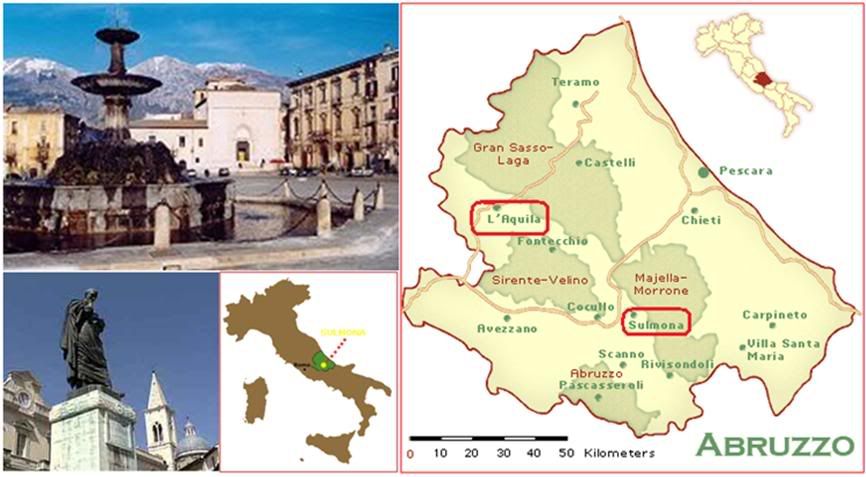 Sulmano in the Abruzzo region is about 170 kms east of Rome, and is best known as the birthplace of the famous classical poet Ovid.
For this item, thanks to Lella's blog
Sulmano in the Abruzzo region is about 170 kms east of Rome, and is best known as the birthplace of the famous classical poet Ovid.
For this item, thanks to Lella's blog
 We really know very little of Georg Ratzinger's World War II experience except that he did his war service on the Italian front - in the Naples area - and that he came back home later than his younger brother did.
We really know very little of Georg Ratzinger's World War II experience except that he did his war service on the Italian front - in the Naples area - and that he came back home later than his younger brother did.
Today, he made a day trip from Castel Gandolfo to a POW camp site in Sulmano, a town in the Abruzzo. It appears that on his slow way back home from the front, Georg Ratzinger and his fellow Germans made a stop of several hours in Sulmano.
Story and photos from the Abruzzo regional newspaper, Il Centro. The photos also show us Mons. Ratzinger's nurse.
Georg Ratzinger revisits
Italian POW camp site
65 years after 'his' war

The Pope's brother, Mons. Georg Ratzinger, visited Sulmano, a city where 65 years ago, he passed through 65 years ago as a Wehrmacht soldier during the retreat of German forces from the Gustav line in central Italy.
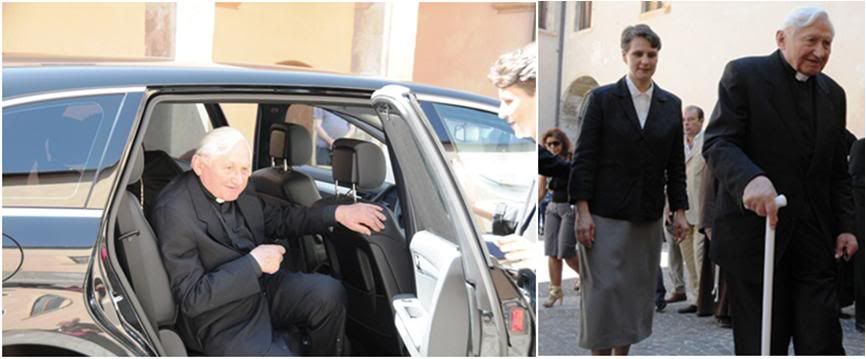
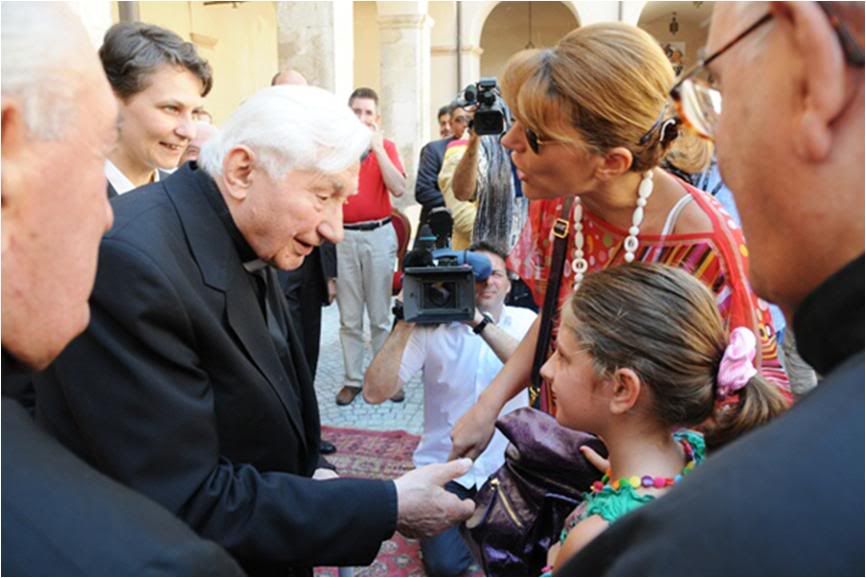
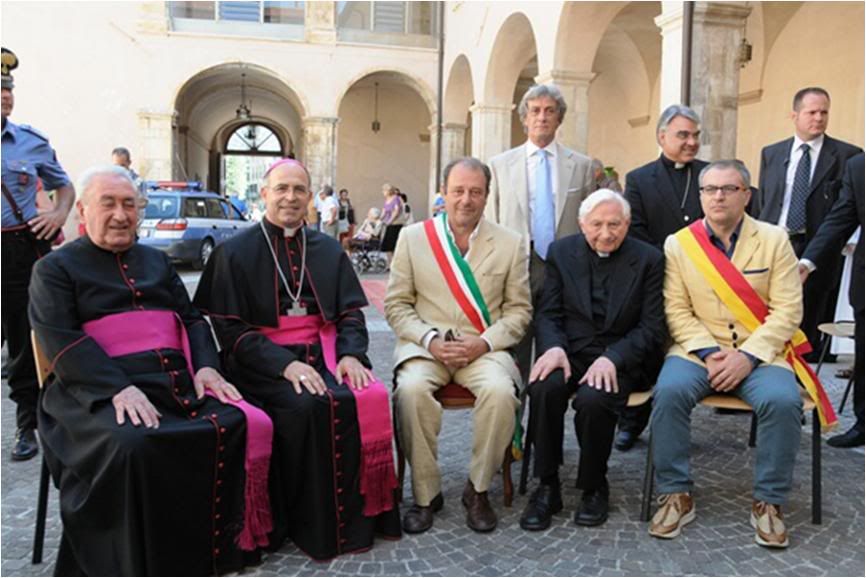
In Ovid's hometown, he was received with full honors by Mayor Fabio Federico and the Bishop of Valva-Sulmona, Mons. Angelo Spina.
A band welcomed his arrival by playing the Ode to Joy from Beethoven's Ninth Symphony.
"I am truly moved by your welcome," the 85-year-old monsignor said, thanking his hosts, "even if I am not the Pope".
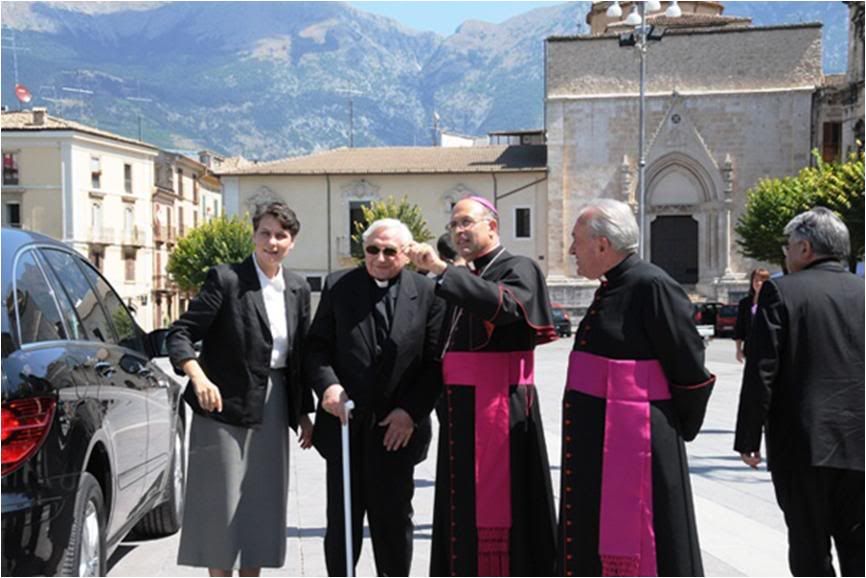
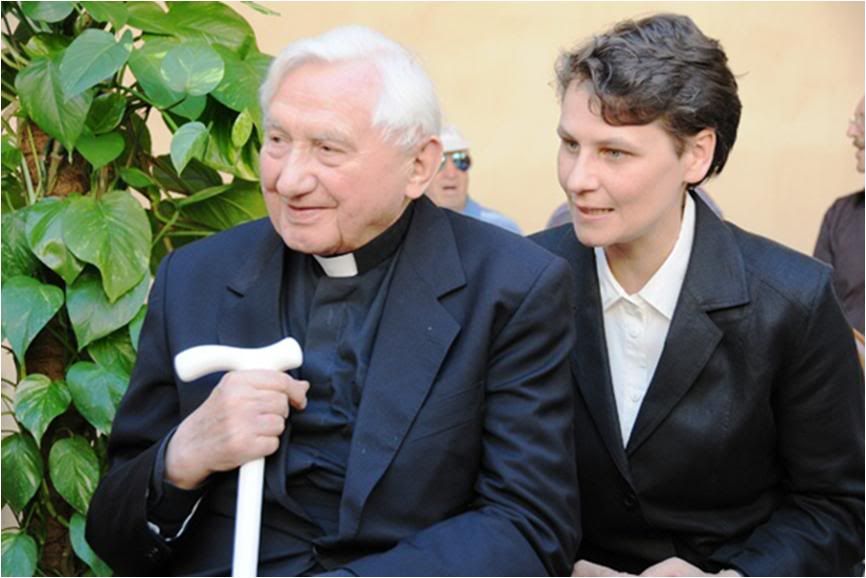
Recalling his transit through Sulmona, he said, "I was here in 1944 just for a few hours, but I have always wanted to come back and visit the city in peacetime conditions."
The Pope's brother visited the abbey, the cathedral and what is now a military logistics base at Fonte d'Amore, site of a POW camp in both world wars.
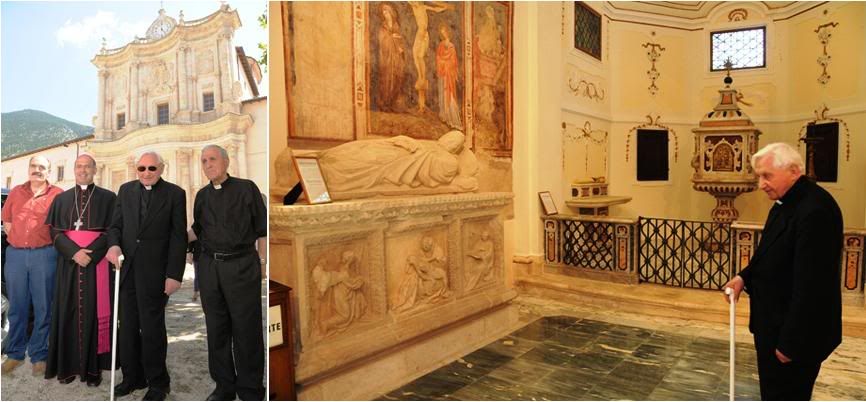
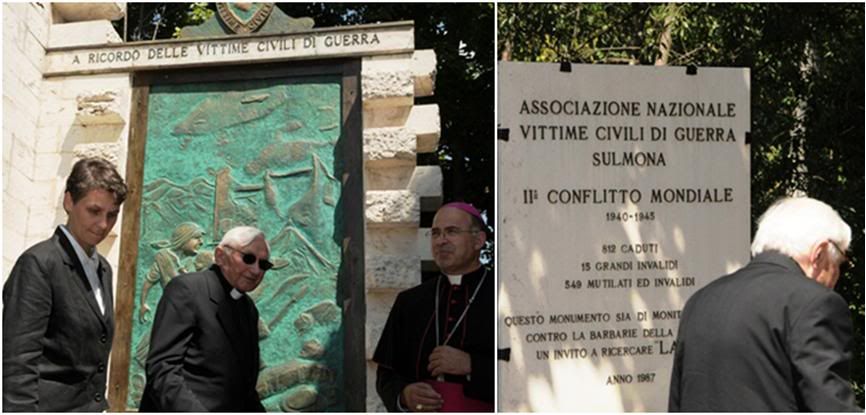 There's a bit more detail in this story in Il Messaggero today:
The Pope's brother gets
There's a bit more detail in this story in Il Messaggero today:
The Pope's brother gets
an affectionate welcome
in Sulmano
by ORNELLA LA CIVITA
Translated from

August 19, 2009
SULMONA - It has been all of 65 years since he first saw these mountains which he always dreamed of coming back to visit.
Yesterday, Mons. Georg Ratzinger, older brother of Pope Benedict XVI, came back to Sulmona in very different circumstances.
Whe he first passed through this mountain city, he had just turned twenty, and he was wearing a different kind of uniform. He was with the German troops who retreated from the Naples area in 1944 after the Allied landings in central Italy.
"I was here for just a few hours, but I always kept in mind that I would want to come back and visit the city in peace time," Mons. Ratzinger said yesterday. "I thank the Lord for having given me this opportunity."
Sister Cristina, who accompanies Mons. Ratzinger, also served as his interpreter.
The 85-year-old prelate now walks slowly, aided by a white cane. He has a ready smile for every well-wisher.
Welcoming him to the city were the bishop of Valva-Sulmona, Mons, Angelo Spina; the mayor of Sulmona, Fabio Federico; the city council president Nicola Angelucci; and cultural counselor Lorenzo Fusco, along with the priests of the diocese.
The local band from Introdacqua played the Ode to Joy from betthoven's Ninth Symphony to welcome the guest.
"It was a big surprise, and I was truly moved by the welcome," Mpns. Ratzinger said. "I thank everyone, with special mention for the band who really played very well. I accept the welcome as a sign of your good wishes towards the Pope.
"I am a humble priest who deserves none of this. But you have good, kind and industrious people who do honor to Sulmona."
After seeing the historical monuments in the town center, the Pope's brother was taken to Fonte D'amore, now a military logistical base, on what was the site of the POW camp where he stayed a few hours back in 1944.
The delegation then proceeded to the Celestinian Abbey, asssociated with St. Celestine V, the Pope whose remains are kept in teh Cathedral of L'Aquila to the north; then to the monument to the civilian victims of a Nazi bomb raid that claimed 120 victims during the war.
The final stop was at the Basilica of St. Panfilo, where he venerated a relic of St. Celestine V.
In greeting Mons. Ratzinger earlier, Mayor Federico rrecalled that in July he had visited Marktl am Inn with his family.
"We took photos before your house in Marktl," he told the Pope's brother, "and my daughter remarked that it would be nice if the Pope or his brother could come to Sulmona and be photographed before our house. And the day has come. Truly, the ways of the Lord are infinite".
PHOTO POST-SCRIPT:
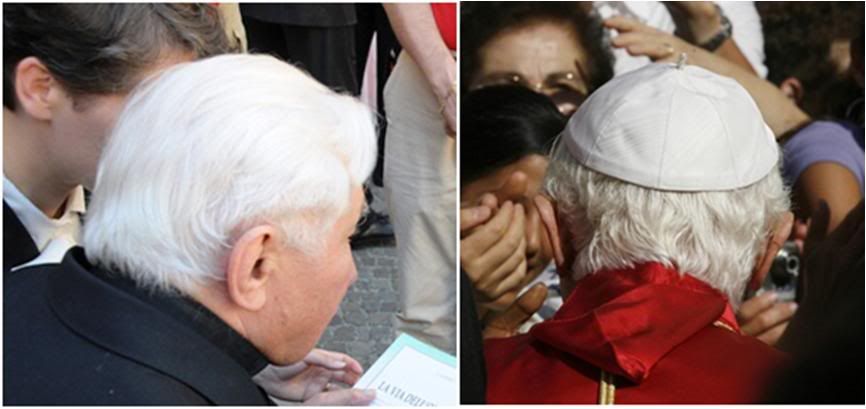 Didn't realize before this that Joseph has rather curly hair compared to brother Georg!
Didn't realize before this that Joseph has rather curly hair compared to brother Georg!
[Modificato da TERESA BENEDETTA 10/12/2009 20:05] |
| |
 25/08/2009 00:45 25/08/2009 00:45 |
|
| | | OFFLINE | | Post: 18.264
Post: 920 | Registrato il: 28/08/2005
Registrato il: 20/01/2009 | Administratore | Utente Senior | |
|
Don Giorgio marks silver jubilee
of ordination in his hometown
From the
8/24-8/25/09 issue of
 In tomorrow's issue, the OR takes note, in a brief item with photo, of Mons. Gaenswein's personal milestone. He took his annual vacation after coming back from Les Combes with the Holy Father.
In tomorrow's issue, the OR takes note, in a brief item with photo, of Mons. Gaenswein's personal milestone. He took his annual vacation after coming back from Les Combes with the Holy Father.
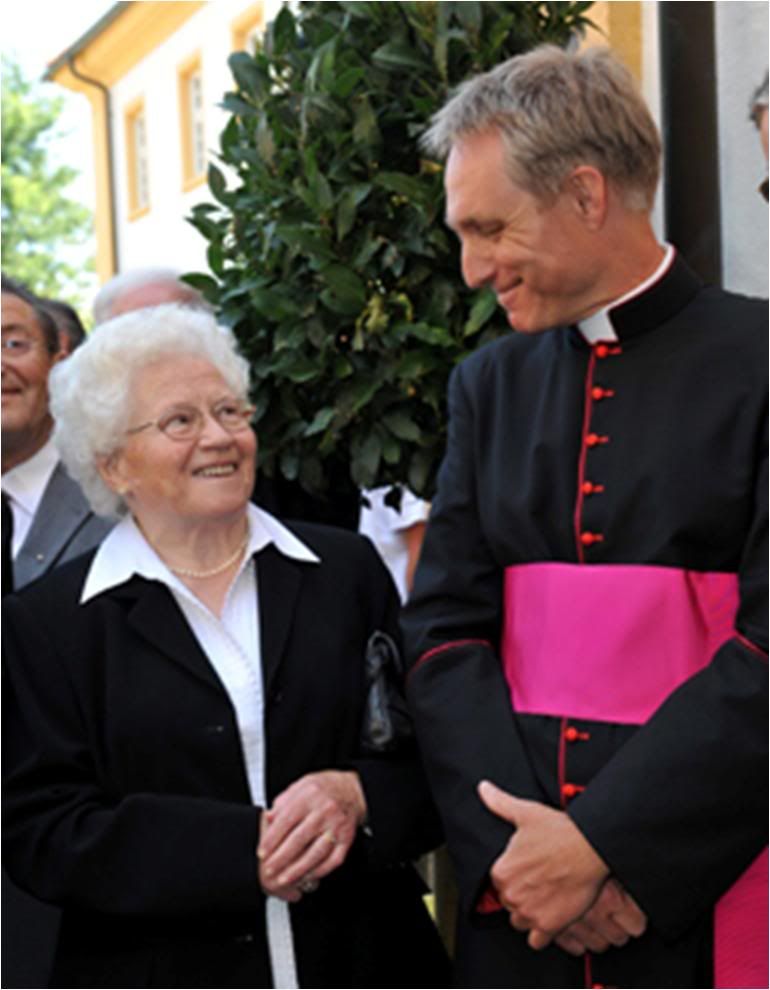
A family celebration for Mons. Georg Gaenswein, private secretary of Benedict XVI, who on August 23, in his hometown of Riedern in Germany, celebrated the 25th anniversary of his ordination as a priest.
At the Mass he celebrated at the local Church of St. Leodegar, many friends, relatives and townsfolk took part, including his mother Gertrud, shown in the photograph.
 We have details of Mons. Gaenswein's Jubilee Mass from the blog of Angela Ambrogetti, and pictures are now available from two regional German newspapers:
From his Silver Jubilee homily:
We have details of Mons. Gaenswein's Jubilee Mass from the blog of Angela Ambrogetti, and pictures are now available from two regional German newspapers:
From his Silver Jubilee homily:
The priest is like a lighthouse keeper
Translated from

August 25, 2009
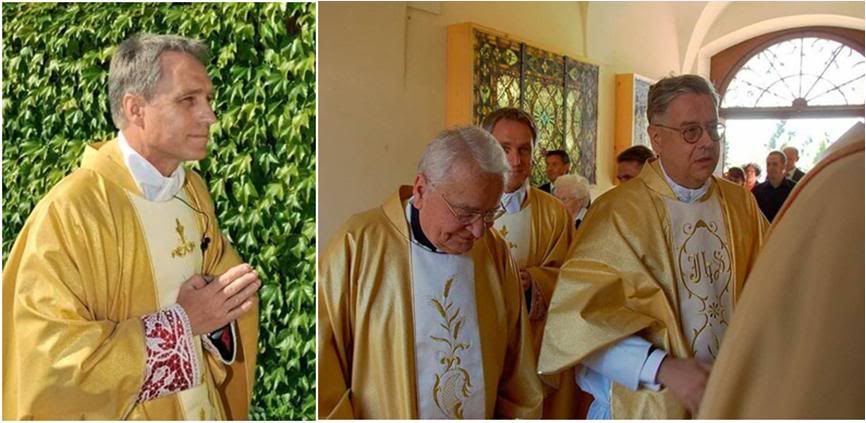
At the grand celebration last Sunday in his Black Forest hometown of Riedern am Wald to mark the 25th anniversary of his ordination as a priest, Mons. Georg Gaenswein, the Pope's private secretary, gave a homily on the function of priests.
He cited a well-known anecdote. One night, the captain of a warship found himself on what seemed to be a collision course with another ship. He called out orders for the other to change course and was enraged when it seemed he was being ignored. Finally, an answer came back from an ensign who called out, "I am the lighthouse keeper!"
That, Mons. Gaenswein said, was the function of a priest. "He is not a ship's captain who gives orders. Our strength does not come from external temporal sources of power. We annhounce an ideal which we ourselves strive to live up to all our life."
He added that on the sea of life, there are also cruisers and luxury ships occupied by 'those who forget God", as well as 'submarine Catholics" who only surface during major holidays and celebrations.
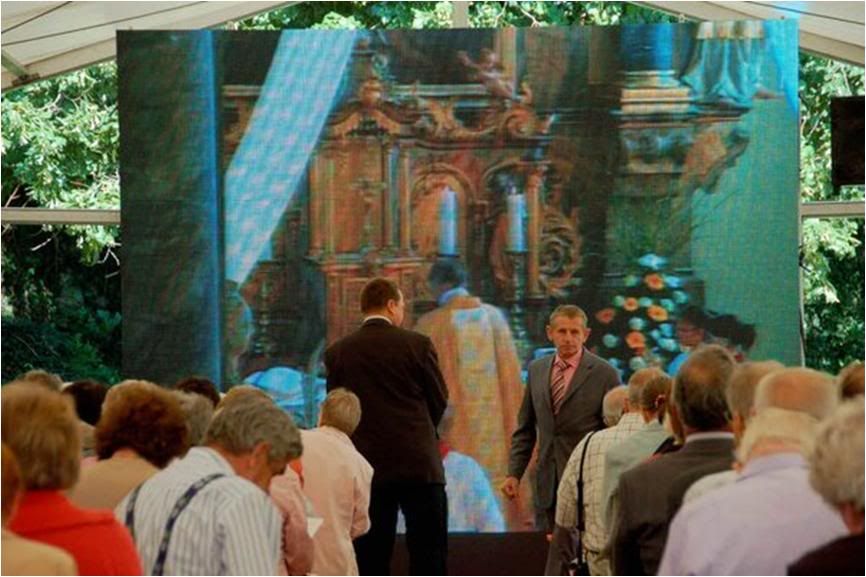
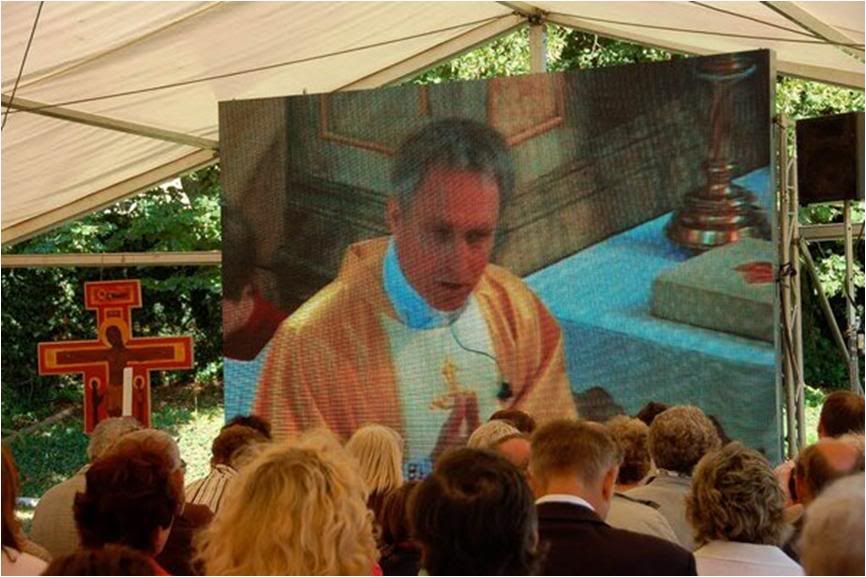
Mons. Gaenswein said Mass for more than 1500 of his townspeople, most of them assembled on the meadow surrounding the parish church of St. Leodegar in Riedern.
No cameras were allowed in the church, but the Mass was televised to a jumbo screen under a tent outside.
The church could only hold 200, most of them his relatives and friends, led by his mother Gertrud. His father, who has been ill for months, was unable to attend.
Photo shows a similar homecoming in 2007, with both parents leading the townsfolk to church.
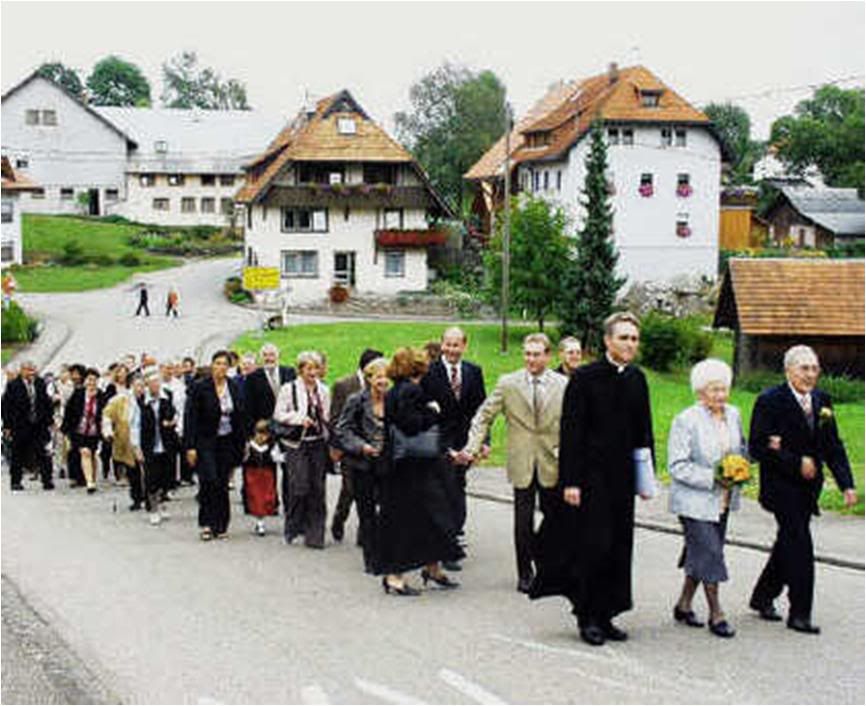
Among his special guests were the Archbishop of Madrid, Cardinal Antonio Rouco Varela and Princess Gloria Thurn und Taxis.
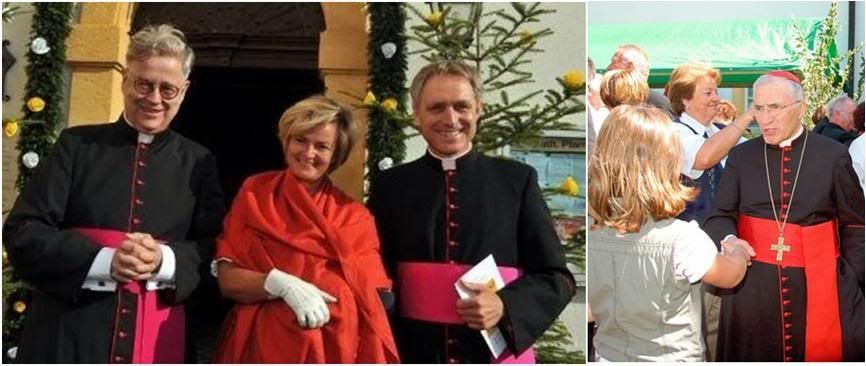
Concelebrating the Mass were his 'Doktorvater' Winfried Aymans, who was his adviser for his doctoral dissertation in canon law from the University of Munich, along with a friend from the Roman Curia, Wilhelm Inkamp, who is a consultant to both the Congregation for Divine Worship and the Congregation for the Causes of Sainthood.
They said the Mass in Latin, and ad Orientem, although the Mass booklet for the occasion was bilingual. The choir sang Mozart.
After the Mass, local authorities paid tribute to their hometown celebrity, who said he was overwhelmed by the emotions of the day "in the place where I have my roots".
The town had prepared for the occasion for days, and local traffic virtually stopped that day. Afterwards, everyone proceeded to the Kreuz restaurant where the chef is a a cousin of the jubilarian priest.
Pictures below from 2007.
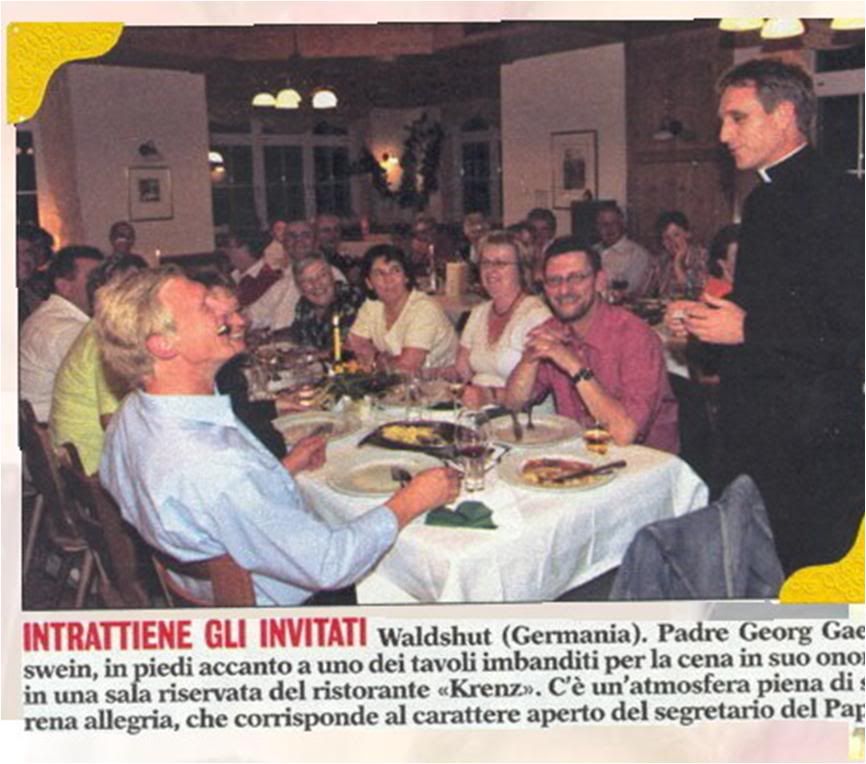
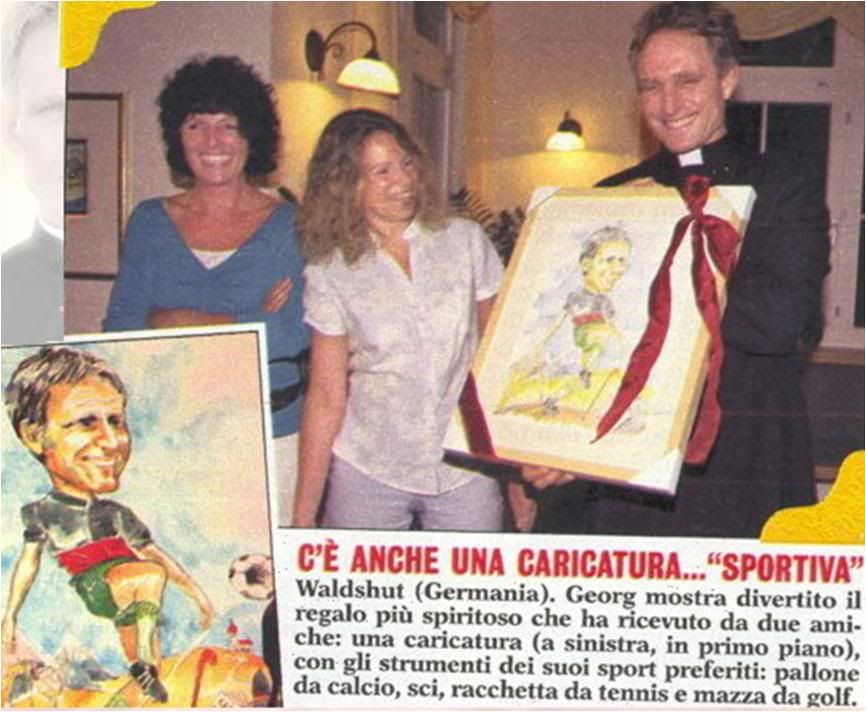
Over lunch, Mons. Gaenswein spoke of the year just past, recalling important episodes that he had shared in his position as the Holy Father's secretary, citing particularly the revocation of the Lefebrian bishops' excommunication and the Pope's pilgrimage to teh Holy Land.
His anual summer vacation, which started after he returned from Les Combes, ends this weekend. he was scheduled to spend four days in Salzburg for the summer music festival, then come back to Riedern to his parents; home before going back to Castel Gandolfo this weekend.
He may perform some baptisms at the monastsery near his home, where he usually says daily Mass at 9 a.m. when he is in Riedern.
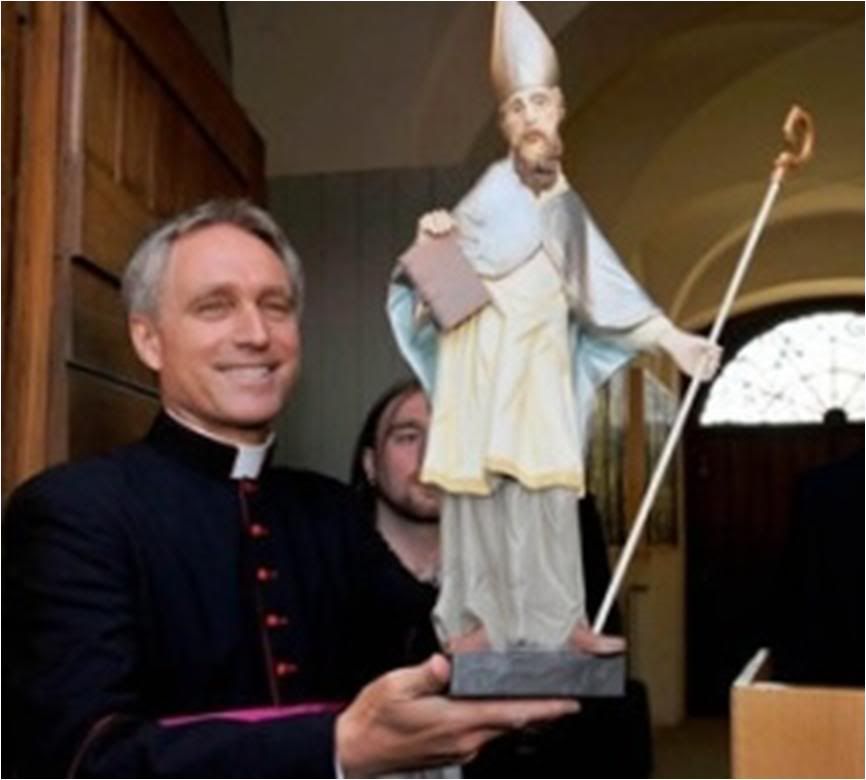 [Modificato da TERESA BENEDETTA 26/08/2009 12:34] |
| |
 26/08/2009 15:47 26/08/2009 15:47 |
|
| | | OFFLINE | Post: 2.102
Post: 29 | Registrato il: 27/11/2005
Registrato il: 21/01/2009 | Utente Comunità | Utente Junior | |
|
Two very interesting reports with amazing photos! I loved the report of Monsignor Georg Ratzinger's visit to Sulmona and those photos especially.
Is Sister Cristina one of the four Memores Domini???? I've forgotten all the names.
 Mary, one of the Papino's Memores is named Cristina, but the Sr. Christina with Mons. Georg is apparently his German nurse-companion.
Mary, one of the Papino's Memores is named Cristina, but the Sr. Christina with Mons. Georg is apparently his German nurse-companion.
TERESA

[Modificato da TERESA BENEDETTA 26/08/2009 16:53] |
| |
 27/08/2009 06:01 27/08/2009 06:01 |
|
| | | OFFLINE | | Post: 18.277
Post: 932 | Registrato il: 28/08/2005
Registrato il: 20/01/2009 | Administratore | Utente Senior | |
|
The cloistered nuns whose job is to serve the Pope directly
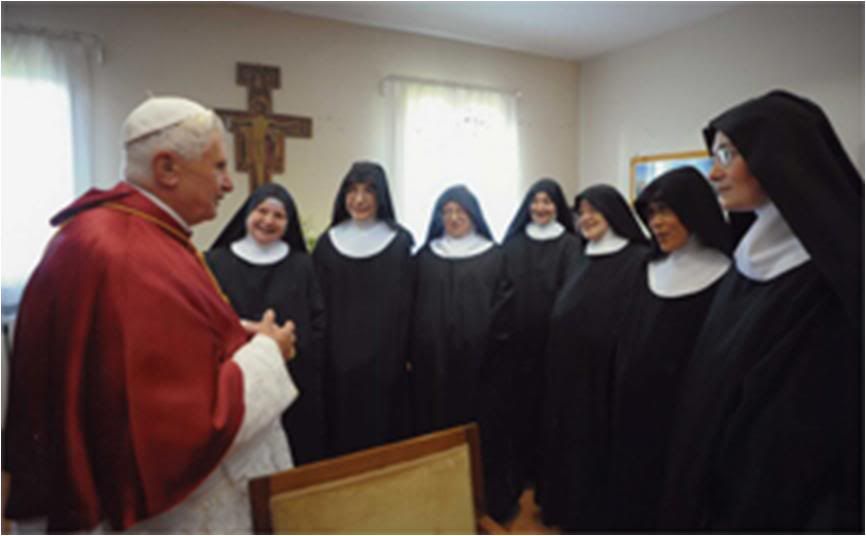 Nuns by vocation, they also raise
Nuns by vocation, they also raise
veggies for the Pope and keep
the papal clothing at Sunday best
There's a Benedictine cloistered order in the Vatican with their own convent called Mater Ecclesiae -
and besides their life of prayer (ora) for the intentions of the Church, they do quite a lot of work (labora)
in direct service to the Holy Father.
by NICOLA GORI
Translated from
the 8/24-8/25 issue of

It's a time of first assessments for the tiny Benedictine community of nuns in the Mater Ecclesiae convent at the Vatican after their first five years there. Years that they see as a call to serve the Holy Father directly in the Benedictine spirit of 'ora et labora'.
The lifestyle is the age-old Benedictine rule based on prayer and lectio divina, as well as manual labor: from the little tasks of gardening in and around the Apostolic Palace, to keeping the apparel worn by the Holy Father in public in Sunday-best condition, from embroidering his miters and stoles, to making parchment paper and miniatured, to cultivation of the Pope's 'backyard garden'.
Faithful to the Benedictine spirit, the nuns actually work the land. With a straw hat, am apron and lots of goodwill. The fruits of their labor are evident daily: fresh vegetables for the Pope's meals, and even special jams prepared with a secret recipe that they jealously guard, not to mention fresh flowers for the Pope's rooms every day.
And everything they grow is 'organic' - no chemical fertilizers but compost that comes to them from the pontifical farm in Castel Gandolfo, according to their Abbess, Maria Sofia Cichetti, who spoke to L'Osservatore Romano:
Can you give us an assessment of the five years so far of the Mater Ecclesiae convent at the Vatican?
It has been a grace and a privilege for us to be here at the center of the Church, especially near the Pope and his co-workers. It has been an experience of getting to look at the heart of the Universal Church.
It is true that in all monasteries and convents, priests and nuns, continually pray for the Pope and the Church, but here, we are in the physical presence of who we pray for.
We are nonetheless a monastic, cloistered presence, and we seek to live ever more fully our consecration to the Lord, above all, in offering our daily prayers for the Pope, for his ministry, for his intentions, for the needs of the Church and of all the world.
In our case, it has been a most enriching and joyful experience, because since we arrived here on October 7, 2004, we have been able to meet with the Pope three times, when he came to say Mass in our chapel: the first time on July 2, 2005; the next time on march 21, 2006; and then again last July 3. Each time we were able to speak to him afterwards, and of course, to receive his blessing.
Do you have any particular memories of these five years?
Our little community is composed of seven Benedictine nuns coming from different continents: a Filipino, an American, two French sisters, and three Italians.
Our communal life has been very beautiful, but not entirely problem-free, because even if we share the same Benedictine spirit, the same rule, the same ideals, we still have different mentalities because we come from diverse nations adn cultures.
We have had to work particularly on being in true communion. Of course, we believe the Holy Spirit brings unity, but he needs our cooperation.
The other beautiful experience is receiving persons who knock on our doors. Because even if we are cloistered, and deliberately cut off from the world, we are never spiritually detached from our fellowmen. Rather, we are here for their good. Everything we offer is for others, and since we are Benedictines, hospitality is something structural, essentially built into us. So every guest is seen as Jesus who has come to visit us.
We mean first of all, a hospitality of the heart, which keeps us open to the needs of others, in our prayers and in our affections. But we also receive guests in the parlor, not inside the convent itself, where we have very little space, and because of cloister rules.
Many people come to seek advice and prayers, but above all, to find a listening ear. In our world today, there's little time for anyone to listen to anybody: everyone is always running, everyone is in a hurry. Many times, people just need to find someone who can listen to their problems and their difficulties kindly. This has led to new friendships which we cultivate in prayer.
The other hospitality we offer is to all the various groups from different countries who come to pray at our chapel. They stay for Eucharistic Adoration, for the rosary, and after the prayers, they stay to share a word.
What is the importance of a monastic community within the Vatican?
We see it, first of all, as a vocation, because we were called here by the Pope. Which is a grace and a privilege. To give ourselves and live our life of consecration in a most special environment, at the Vatican, virtually in the Pope's household, where we try to do everything with love and with joy.
What are your sources of support for carrying on the monastic life?
The Pope's assistance, above all. Then, what we 'earn' with our work, because it is right that we should be able to contribute to our own subsistence, like the Holy Family of Nazareth. This is also required by our own Benedictine rule of 'ora et labora'.
Our main manual labor is what we do in the Pope's 'backyard garden' where we raise vegetables for the Pope's table and our own community.
Then we do translation work, we embroider liturgical objects for the church, and we make parchments and miniatures on commission. All of this brings income for the community.
The other work that we love to do, and which is an honor for us, is to take care of the Pope's cassocks, the gsarments that he wears in public.
Left photo, Abbess Sophia presents the Pope with some linens for the Church; right, caring for the Pope's garments.
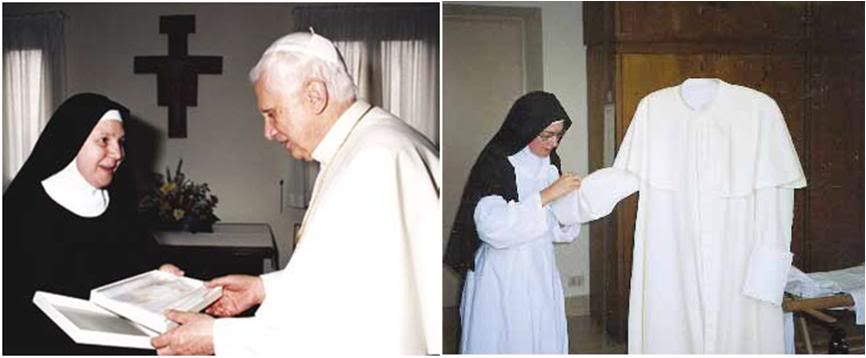 Have you established a network of friendships during this time?
Have you established a network of friendships during this time?
Yes. Very much. Including those with generous patrons, whose goodness is really quite moving. They send us provisions, furniture and other useful objects. And since we cannot accumulate superfluous things, we are able to share a lot of these with the poor.
We have two special beneficiaries right here in the Vatican: the Casa Dono di Maria run by the sisters of Mother Teresa, where they welcome many needy persons daily; and the Santa Marta pediatric clinic, which takes care of sick babies and children.
In these days of crisis, there are families among those we have come to know who need a helping hand, and we are glad that we can help somehow by sharing what we have - food, clothes. toys. We do not think of this as 'doing charity' but rather as sharing things with our brothers and sisters.
What kind of work do you do in the garden?
It's a beautiful experience for us because we are in contact with nature, adn therefore with its author, God. Tilling the soil is praying with one's hands, as well as a way of praising the beauty of Nature and of the Creator. To see the seeds germinate, to watch the seedlings grow, then see the first flowers and later the fruits - just following plant life in all its stages is fascinating. And it all helps us for prayer and contemplation.
Hoeing, digging and watering plants can be tiring, but it's all worth it when we harvest our tomatoes, peppers, zucchini, cabbages, saslad vegetables, mint and other herbs. And all of it is raised organically - with compost and cattle wastes that we get from the Pontifical Villas in Castel Gandolfo.
We don't have an orchard except for a few orange and lemon trees, from which we prepare marmalades according to a traditional recipe. This we do not sell - we give it to the Pope, who appreciates it a lot, and to our benefactors.
We also tend a flower garden for liturgies in our chapel. We grow most especially two varieties of roses - the Beatrice d'Este, which is red, and the Giovanni Paolo II, which is white and very fragrant. During the flowering season, we send roses to the Pope every week because we know he loves them.
What do you say to those who think that cloisters are anachronistic?
That cloistered life is a calling. It's a special vocation that comes to us from God, who calls us to live more intimately with him. It's not a separation or an escape from the world, but a retreat that allow us to live in greater unity with the Lord and all our fellowmen through prayer and spiritual charity.
The essence of Christianity is love, and we know this can be expressed in so many ways. This is how we live it. We associate ourselves with Christ in thr Eucharist, but hidden away, in silence, offering ourselves to the Lord for the life of the world.
Not however for selfish reasons, because it is more restful to live in quiet and tranquility - that would be selfishness. Our lifestyle enables us to give ourselves more and in better ways to God, and to offer our love to everyone with missionary fervor.
The monastic life is a true calling, a most beautiful one, which brings peace, joy and happiness.
Does the Year for Priests also involve a contemplative community like yours?
Yes, we feel that we are called on by the Pope to help bu prayer and even more intense offerings for priests and seminarians. For ourselves, this year, we intend to strengthen our spiritual motherhood - a nun is a consecrated person who loves God sincerely but loves him with a human heart which is also consecrated to our fellowmen, including priests.
SPIRITUAL MOTHERHOOD FOR PRIESTS
In December 2007, the Prefect of the Congrgation for the Clergy, Cardinal Claudio Hummes, wrote to all the bishops of the world, requesting them to encourage Eucharistic adoration for the holiness of priests and to recruit "spiritual mothers" to pray for priests and for vocations to the priesthood.
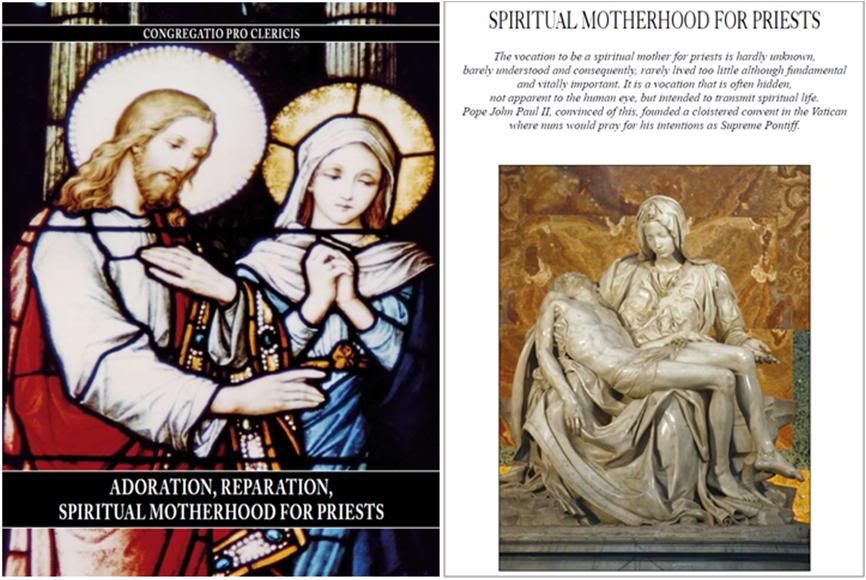
The letter was accompanied by a 40-page brochure (cover above) from which the following pictures concerning the Mater Ecclesiae community were taken:
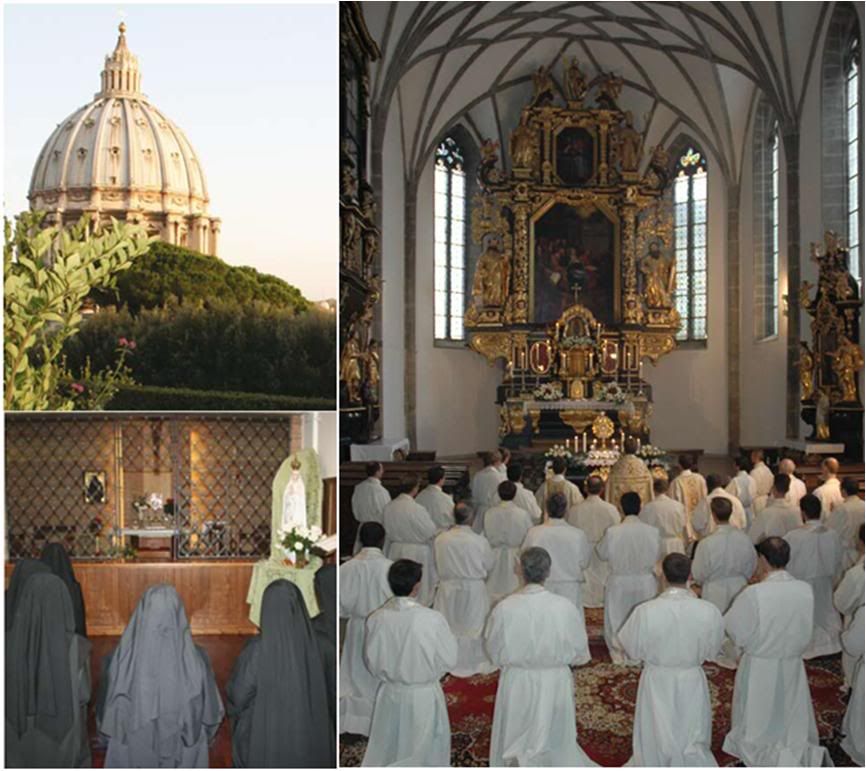
At the heart of the Vatican, in the truest sense of the word, in the shadow of the dome of St. Peter’s Basilica, lies the convent consecrated to “Mater Ecclesiae”, Mother of the Church.
This simple building, previously used for other purposes, was remodelled some years ago to fit the needs of a contemplative order. John Paul II intentionally had the inauguration date set on 13 May 1994, the anniversary of the first apparition of Our Lady of Fatima.
In these quarters the nuns consecrate their lives for the needs of the Holy Father and the Church.
Every five years this responsibility is assumed by a different contemplative order. The first international community was composed of Poor Clares from all over the world (Italy, Canada, Russia, Bosnia, Nicaragua, and the Philippines).
The Carmelites took their place in 1999 and continued to offer their prayers and their lives for the intentions of the Pope.
Since October 7, 2004, the Feast of Our Lady of the Holy Rosary, Benedictine nuns from four different countries came to live in the convent.
The Benedictines met John Paul II in his private library in December 2004.
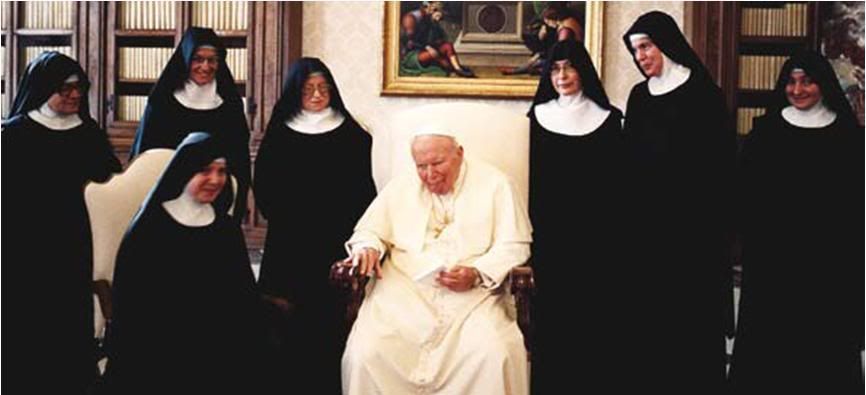
[It is surprising that the OR says nothing about whether the Benedictines are moving out as their 5-year term comes to a close. Or will an exception be made in their case?][Modificato da TERESA BENEDETTA 27/08/2009 07:22] |
| |
 02/09/2009 00:09 02/09/2009 00:09 |
|
| | | OFFLINE | | Post: 18.314
Post: 969 | Registrato il: 28/08/2005
Registrato il: 20/01/2009 | Administratore | Utente Senior | |
|
 I am posting this article - and took the trouble to translate it - only because it represents a secular point of view, that may or may not be valid, about what is taking place within the Vatican. It is very much in the style of the facile speculations that the Italian weekly magazine Panorama usually indulges in. Il Sole 24 Ora is Italy's equivalent of the Financial Times and is widely read.
Bertone goes full steam ahead
I am posting this article - and took the trouble to translate it - only because it represents a secular point of view, that may or may not be valid, about what is taking place within the Vatican. It is very much in the style of the facile speculations that the Italian weekly magazine Panorama usually indulges in. Il Sole 24 Ora is Italy's equivalent of the Financial Times and is widely read.
Bertone goes full steam ahead
towards full power in the Curia
by Carlo Marroni
Translated from

Sept. 1, 2009
The 'junk', or the 'information', depending on your viewpoint, about Avvenire editor Dino Boffo, has certainly accelerated consolidation of Ratzingerian power within the Leonine walls. ['Certainly'? Or 'appears to have...'?]
Management of the crisis brought about by Boffo's case has made evident that Cardinal Tarcisio Bertone has consolidated his power in the Roman Curia within three years of his nomination as Secretary of State. [But Bertone power is not necessarily always 'Ratzingerian power'!]
There are still dissenting voices - as, for instance, a longtime diplomat who thinks that cancelling Bertone's dinner appointment with Berlusconi was an error, because it confused the institutional aspect of the job with a political issue. [But Berlusconi decided he wouldn't show up, and the dinner host decided there would be no dinner.]
The political-juridical-mediatic affair involving Boffo will have the same effect as a storm at sea: it doesn't last long but it stirs up the depths of the sea and turns up all sorts of things.
But the Boffo case has served in the short term to bring together various lines of thought among Italian prelates who move between the Curia and the Italian bishops' conference (CEI); and it has made visible the chaos that still reigns in the relationship of the Church, in general, with the political world, and with the normalization of such relations that had so far been achieved by Papa Ratzinger's Curia.
The Church is universal, but in Italy, questions affecting the Italian Church naturally take center stage. This can be seen in the 'interventionism' of high Church circles in the affairs of government [When the Church enunciates its doctrines on social issues, that is not interventionism at all, and certainly not in 'affairs of government'. Unless the writer means the individual opinions expressed by some Curial prelates critical of specific actions by the government, such as a perceived lack of compassion for the plight of illegal immigrants], or the reaction of L'Osservatore Romano to comments on the Church in the secular media, or the level of confrontation on events and issues that are even more concerning in other countries, also Catholic.
Until two years ago, dealing with Italian politics and politicians had been entrusted by John Paul II to his faithful Vicar, Cardinal Camillo Ruini, who led the CEI for more than 15 years (two years of it under Benedict XVI).
Ruini skillfully steered the Church in the post-Christian Democrat era with quite striking results, dealing setbacks to the center-left, splitting them over issues several times, then practically drew a line for a compliant Berlusconi when the latetr came back to power.
But times have changed, the pastoral and apolitical Cardinal Bagnasco replaced Ruini, and Bertone promptly took upon himself the role Ruini used to play, even saying so in writing so that the CEI and Bagnasco would be clear about it.
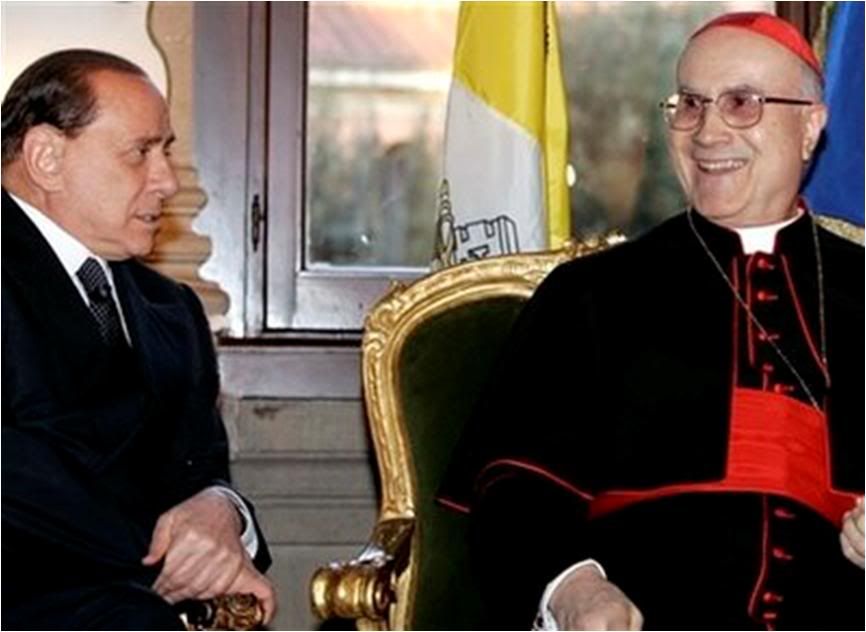
Bertone, a Salesian who has become quite close to Ratzinger, has progressively taken the Curia in hand over the past three years, giving it a stamp different from the diplomacy and politics long followed at the Secretariat of State dating back to Cardinals Casaroli and Silvestrini down to Cardinal Sodano.
A style, however, that proved rather weak, especially at the start of the year with the FSSPX fiasco, which showed a failure of governance that strengthened the hand of Bertone's opponents in the Curia.
Now there's a new climate. The success of the Pope's trip to the Holy Land and of his encyclical Caritas in Veritate gave a fresh coat of paint to Bertone's leadership [Excuse me, but that was all thanks to the Pope, not to Bertone or anyone else in the Curia!], who has also now positioned his own people in strategic positions within the Curia, starting with the young Ettore Balestrero, the new undersecretary for foreign relations. [Are the new Curial nominations Bertone's people primarily, or Pope Benedict's people?]
He has also re-launched relations with his deputy for internal affairs, Mons. Fernando Filoni, who headed those who rooted for the American Brian Wells to be named general counsel for internal affaits replacing the Sodanist Mons. Gabriele Caccia.
But the central given is that Bertone has definitely assumed full powers, which until recently, did not seem to be the case. [How does Marroni know this for a fact?]
The currents that worked against him were all traceable to the so called 'Sodanists' - effectively, all the diplomats in the Secretariat of State who resented the fact that Bertone had no prior experience in Vatican diplomacy, and to the 'Ruinians' who are still influential in the CEI and in the dioceses - the sector that has been most involved in the Boffo case.
Bertone has expressed his maximum solidarity with Boffo - who was named editor of Avvenire by Ruini and who remains very faithful to Ruini and his former #2 man, Mons. Giuseppe Betori, now Archbishop of Florence - in the current controversy, although it is a setback to the line that Bertone has assumed lately in regard to attacks by the Church against the Italian government and its Prime Minister.
When Bertone said, in the interview given to L'Osservatore Romano last week, that everything individual prelates say cannot be attributed to the Vatican or the Pope, he was making it clear that the Church should speak with one voice (unless perhaps the prelate is named Veglio or Fisichella) [references to prominent prelates who in recent months have taken positions that can be described at the very least as equivocal or confusing with respect to the official Church line, but which, for some reason, Bertone has sanctioned], and automatically revaluing those who generally work quietly, such as the Pope's current Vicar for Rome, Cardinal Agostino Vallini.
Moreover, Bertone denounced 'maneuverings and gossip' in the Curia, sending a clear warning to those who are working surreptitiously who still do not understand that a sea change has occurred.
When the Pope went to Bertone's hometown of Romano Canavese during his vacation last July, it was a vote of confidence in his 'prime minister' that gave the lie to many rumors that Bertone was in hot water, especially when he was not among four cardinals (Ruini, Bagnasco, Scola and Schoenborn) whom the Pope summoned to Castel Gandolfo recently for a consultation.
Of course, Bertone's consolidation of power - which may soon include changes at the Vatican bank IOR, in which Cardinal Sodano maintains some influence - has taken place incrementally, and the effective 'emptying out' of any direct political role for the CEI has not been taken lying down: many bishops still insist on expressing their personal positions, contributing to create an impression of confusion to the outside world - a confusion with Bertone's Curia wishes to correct.
Also, bishops are marking out their personal niches, such as the Patriarch of Venice, Angelo Scola, who appears to eschew Italian affairs in favor of promoting dialog with the Muslim world through his Oasis Foundation.
Or Archbishop Carlo Cafarra of Bologna, who holds a firm conservative line on bioethical issues, the field in which Church influence is most likely to be challenged these days, starting with the campaign to disallow widespread use of the abortifacient RU-486.
Berlusconi and his ministers are now trying to regain ground and consensus from the Church hierarchy, so the Church may have a good hand for now. But it may have to fight for retaining government funding for Catholic schools. [It is perhaps to Berlusconi's credit that he does not see 'good relations' with the Church as a political disadvantage.]
The editor of L'Osservatore Romano, Giovanni Maria Gian [Bertone's man], said yesterday that the relations between the Holy See and the Italian government are 'excellent', presumably articulating the line from the Third Loggia [refers to the physical location of the Secretariat of State in the Apostolic Palace]
Moreover, Vian also criticizes the CEI newspaper Avvenire for its editorial denunciations of government policy on immigration - and given what is happening, this too is significant. [Namely, that Bertone does not want Avvenire to attack the government?]
I dislike the entire premise of this article which implies that Bertone is really the decisive power in 'running' the Church. Yes, he is administratively responsible for the government of both the Holy See and the Church - just as the Prime Minister of a secular government is.
But the Church is not a democracy, and the Pope has no 'Deputy Vicar of Christ' or "Deputy Successor of Peter'. He is absolute sovereign of both the Holy See and of the Roman Catholic Church.
Bertone's role is to assist the sovereign in practical matters, which means, to execute actions which the sovereign wants and intends. Not to carry out initiatives of his own for the sake of consolidating power. Power is not necessarily defined by how many key positions he is able to fill with his own people. What he does with it is what matters.
I will believe he has consolidated power in the Curia when he is able to stop heads of dicasteries, like Cardinal Kasper, or prominent cardinals like Cardinals Schoenborn and Lehmann, from publicly expressing opinions which are openly critical of the Pope.
Or better yet, when he is able to mobilize all of the Curia, the major cardinals and the bishops of Italy, at the very least, to promptly express support for the Pope when he is under fire from the media and secular leaders - something that has not happened in the past, and Bertone himself was conspicuously missing in action in the days immediately following the recall of the FSSPX excommunications!
If Bertone can do that, then that is the best test of how much power he has. Not whether he can prevent other Catholic media from criticizing the Italian government - an unworthy and crass objective when bluntly expressed.
Cardinals Ruini and Bagnasco beat back the Prodi government on its proposed legislation to recognize homosexual marriages by relentlessly pushing the Catholic position - not by being friendly to them. But also without Avvenire making any personal attacks against Prodi and his fellow 'adult Catholic' ministers.
And to his credit, Silvio Berlusconi, for all his questionable morals, has been sensitive enough not to force himself on the Vatican.
When the media began speculating that he planned to be in Viterbo to represent the Italian government, so he could have an opportunity to meet with the Pope, he promptly announced he had no plans to go to Viterbo.
When the media reported that it was bad form for him to go to L'Aquila on the day of the observance of the Celestinian Pardon, given his current moral problems, he promptly cancelled going to L'Aquila.
And even last March, before the new round of scandals arose about him, he did not try to take advantage of the Pope's visit to L'Aquila to share the spotlight, even though as Prime Minister, he had every business to be there as often as he could after the earthquake [as he has been].
And as I pointed out, he has never been reported to openly seek receiving Communion, because he is a divorcee. He attended the Pope's Mass in Cagliari this time last year - because he has a summeer home in Sardinia - but did not present himself for Communion.
All that does not excuse his questionable behavior with young women, but at least, he has been proper in his relations with the Vatican and the Church.
Here is Sandro Magister's take on the issue. He actually ties in the case of Obama and the Catholic bishops with the Berlusconi case, but a) I do not believe the situations are comparable at all; and b) this discussion is all about the Italian situation, so I shall not include the first part of the article which may be seen in full on
chiesa.espresso.repubblica.it/articolo/1339839?eng=y
The Church, Berlusconi and Obama:
Confusion among the powers-that-be

ROME, August 31, 2009 – For a few months, two political leaders of the highest order have been under critical observation by the Church hierarchy in two key countries for worldwide Catholicism: Barack Obama in the United States, and Silvio Berlusconi in Italy.
In both cases, the Holy See and the respective national episcopacies are not taking the same approach. The Vatican authorities appear more inclined to a peaceful and conciliatory relationship, while the national episcopacies appear more critical and combative.
And in both cases, two Church newspapers are also participating in the conflict: L'Osservatore Romano, an organ of the Vatican, and Avvenire, the newspaper owned by the Italian bishops' conference.
.....
THE BERLUSCONI CASE
With Italian Prime Minister Silvio Berlusconi, there have been two main causes of friction with the Church in teh past two months.
The first is immigration. The Berlusconi government applies very strict rules in deciding admission and keeping out illegal immigrants. And this has provoked criticism from many Church organizations, for which "welcome" is the first precept, if not the only one.
The official stance of the Italian bishops' conference CEI), according to which welcome must be accompanied and balanced always by legality and security [also the posotion that pope Benedict XVI publicly advocates], is therefore considered – by the Catholic clergy and laity most involved in social assistance, and by some of the bishops themselves – as being excessively moderate, or worse, subservient to the Berlusconi government. The same thing with the newspaper owned by the bishops, Avvenire. [The bishops' newspapere contradicts and criticizes the bishops, is that it????]
But if one compares Avvenire with L'Osservatore Romano, the Vatican newspaper appears by far more respectful of the government's decisions on immigration.
Giovanni Maria Vian, the history professor who edits the Vatican newspaper, said in an interview with Corriere della Sera today that some of the articles in Avvenire have been so "exaggerated and imprudent" in criticizing the government so as to cause concern at the Vatican. [And I maintain Vian has no business commenting on the editorial policy of Avvenire! It's bad form, unprofessional, improper and a lapse of taste on his part.]
He denounced two of these in particular: an editorial comparing the apparent indiffrence of everyone to the shipwreck of African migrants in the Mediterranean with the extermination of Jews in the Shoah [an erroneous accusation has textually shown not to have been in her editorial at all!]; and another article contesting the statement of the Italian foreign minister that Italy is the European country that has helped the most immigrants at sea.
But even at the Vatican itself, there is no lack of dissenting voices. [You cannot be serious! That has to be the understatement of the decade!]
Archbishop Agostino Marchetto, secretary of the Pontifical Council for migrants, is extremely critical of the stance of the Italian government on illegal immigrants, and is understandably quite a favorite with the anti-Berlusconi media, even if the Secretary of State has said more than once that when individual prelates in the Curia express their personal views, they do not speak for the Holy See or the Pope.
Another loose cannon against the government's immigration policy in the Curia is Cardinal Renato Martino. But he was recently replaced as president of the Pontifical Council for Migrants by Archbishop Antonio Maria Vegliò, who comes from the world of diplomacy and is prudence personified.
In short, "relations between the two shores of the Tiber are excellent," Professor Vian said in the same interview, meaning by the two shores the Italian government and the Holy See.
The OR editor cited and defended his newspaper's total silence on the second element of the current clash between Berlusconi and the Church.
This second element concerns the Prime Minister's private life, in particular, reported sexual escapades that Berlusconi has dismissed with the words, "In Italy there are so many pretty girls, and I'm not a saint."
The campaign of accusations against Berlusconi's private life was ignited in mid-June by his second wife – from whom he is separating – and above all by La Repubblica, the leading newspaper of the Italian left, which, paradoxically, has always preached liberation from the bonds of Catholic morality.
Since then, this curiosity about Berlusconi's sex life has occupied the pages of many newspapers, not only in Italy, but also around the world. Not, however, in L'Osservatore Romano, which has not printed a single line.
And "for excellent reasons," Vian says, refusing to get the Pope's newspaper mixed up with a journalism "that seems to have become an extension by other means of political infight5ing".
At first, Avvenire, the newspaper of the Italian bishops, also kept silent. Or at the most, it prudently expressed the wish that the prime minister could eliminate "shadows" and "situations uncomfortable for all."
But in the meantime, more and more, many bishops, clergy, and laity expressed outrage at Berlusconi's behavior that Avvenire joined the fray.
At the end of June, two days in a row, the newspaper published a pair of opinions side by side: in the first case, by two editorialists for the newspaper, Marina Corradi and Piero Chinellato; in the second case, by two outside commentators, Antonio Airò and Professor Pietro De Marco.
Only Chinellato sided with a public denunciation "ad personam." The others, with different arguments, maintained that although one should denounce the sin but not the sinner, a politician must be judged for what he does politically.
And what about the Italian bishops' conference, publisher of Avvenire? On July 6, the feast of Saint Maria Goretti, a young martyr who died in defense of her virginity, the secretary of the CEI, Mons. Mariano Crociata, lashed out against "the display of a gleeful and irresponsible libertinism," which all of the media interpreted – without any denial – as alluding to Berlusconi.
This homily was like the breaking of a dam. What many bishops, priests, and laity had already been doing on their own - criticizing the prime minister's sex life – was now carried out from that point on by the editor of Avvenire, Dino Boffo, apparently responding to increasing pressure from readers, some of them highly placed.
Boffo would say something, and immediately someone else would tell him that he had to say more. A perfect specimen of this relentless pressure was the letter from a priest in Milan, published on August 12 with the umpteenth response from Boffo.
This display – unintentionally staged by Avvenire itself – appeared to show that the Italian bishops lacked an authoritative and vigorous leader, and that control appeared to be with who shouted loudest against Berlusconi. Even if his government has been quite attentive to the Church's interests in the defense of life and the family.
Vatican Secretary of State Tarcisio Bertone sought to impose some control and arranged a meeting with Berlusconi in L'Aquila on August 28, on the occasion of the annual pardon instituted by Pope Celestine V.
Before the meeting, Cardinal Bertone gave an extensive interview to L'Osservatore Romano, in which he was very reassuring in discussing relations between the Church and the Italian government.
On the same day, in La Repubblica, lay theologian Vito Mancuso accused the Bertone of wanting to dine at the table of Herod, instead of denouncing his misconduct.
L'Osservatore Romano immediately responded [in a front-page editorial the next day] that the Church does not accept "partisan involvement in contingent political matters," because its concern is for "the individual care of consciences," not public condemnation of the sinner.
At the last moment, the meeting between Berlusconi and Cardinal Bertone was scrapped because of an unexpected attack against Boffo by teh editor of Il Giornale, the newspaper owned by Berlusconi's brother.
In the August 28 issue, Il Giornale had a front page story headlined: "Sexual incident involving 'Avvenire' editor. The supermoralist has been charged with harassment. Dino Boffo, at the helm of the Italian bishops' newspaper and involved in a fiery press campaign against the transgressions of the prime minister, intimidated the wife of the man with whom he had a relationship."
In the following days, the attack was revealed to be dubious and falsely founded. Boffo declared his innocence. [He did not, exactly. He admitted paying a fine to the court for the 'telephone molestations' that he claimed were made on his cellphone by a teenage drug addict whom he was trying to rehabilitate. And frankly, he has yet to contest the claim that he is homosexual. Because if he is homosexual, he will always be a target for the enemies of the Italian bishops and the Church, and would therefore be untenable in his high positions.]
The current president of the CEI, Cardinal Angelo Bagnasco, defended him completely. And so did his predecessor, Cardinal Camillo Ruini, who had named Boffo to be editor of Avvenire and had confirmed his trust in him when rumors began to circulate against Boffo in 2002.
The accusations have been made in anonymous fliers that have been distributed any time there was a desire to attack, through Boffo, the presidency of the CEI.
For example, during the dispute over the appointment of the rector of the Catholic University of Milan, when Ruini's man, Lorenzo Ornaghi, faced stiff opposition from then-secretary of state Cardinal Angelo Sodano, former president of the Italian Republic Oscar Luigi Scalfaro, former prime minister Emilio Colombo, and the director of the university at the time, Carlo Balestrero, all members of the Istituto Giuseppe Toniolo that oversees the university and of which Boffo is also a member.
Recently, these anonymous fliers were circulated again, with the avowed intention of displacing Boffo from all his CEI positions - as editor of Avvenire and as director of teh CEI radio and TV stations. [The flier, in the form of an anonymous letter, was the basis for Feltri's most defamatory accusation against Boffo, that he has a long-standing reputation as a homosexual, with prior complaints received by the police.]
On August 31, the bishop of Mazara del Vallo, Domenico Mogavero, former undersecretary of the CEI and now president of its legal affairs council, said that "for the good of the Church and of his newspaper... Boffo might consider whether it is appropriate for him to resign."
The attack against Boffo in Il Giornale – which is counter-productive for Berlusconi who wants good relations with the Church -
was acknowledged by Osservatore only with a brief indirect quote from Cardinal Bagnasco's homily which touched on the issue.
As for the confusion in the Italian Church, Cardinal Bertone may now be tempted to take back the letter that he wrote on March 25, 2007, to Cardinal Bagnasco, on the occasion of his appointment to as president of the CEI, in which he asserted "the respectful guidance of the Holy See, as well as my own [. . .] concerning relations with political institutions."
Written when the extraordinary leadership of Cardinal Ruini was still at its peak, that letter was interpreted by the CEI as a slap in the face. Cardinal Bagnasco did not reply.
Now it has become strangely relevant again.
[But why would Magister think that Bertone would want to take back the letter? On the contrary, if the CEI were as confused and leaderless as Magister says, it would seem to prove that Bertone was 'right' about wanting to arrogate all political dealings with the Italian government to himself and away from the CEI!
Magister was very critical of the letter then, claiming it was an unwarranted attempt at a power grab by Bertone. Even if not a naked power grab, it was certainly unwarranted, to say the least, considering that the CEI represents the Church of Italy, not the Vatican.
And confusion is hardly the right word to apply to the CEI! Rather there is outright division, with the anti-Curia bishops - sometimes openly anti-Benedict - being among the most outspoken, particularly in the matter of the liturgy and the FSSPX.
The accusation of confusion also ignores that Cardinal Bagnasco has always been clear, firm, unequivocal and prompt about expressing the official position of the CEI on the side of Benedict XVI!
[Modificato da TERESA BENEDETTA 02/09/2009 01:37] |
| |
 15/09/2009 01:10 15/09/2009 01:10 |
|
| | | OFFLINE | | Post: 18.398
Post: 1.051 | Registrato il: 28/08/2005
Registrato il: 20/01/2009 | Administratore | Utente Veteran | |
|
 I had been meaning to do a post on Cardinal Ruini because in the recent brouhaha over Avvenire, and I had set aside a long article by him published last week in Il Sole 24 Ore on the subject of secularism in liberal democracies today.
I had been meaning to do a post on Cardinal Ruini because in the recent brouhaha over Avvenire, and I had set aside a long article by him published last week in Il Sole 24 Ore on the subject of secularism in liberal democracies today.
Thankfully, Sandro Magister has now provided the translation to that article, plus an appropriate introduction for context. I feel this is particularly important after all the recent careless commentary, even by normally sensible reporters, that appeared to minimize or even denigrate the role Cardinal Ruini played to keep the Catholic presence felt on the Italian political scene in the years following the collapse of the Christian Democrats.
From the commentary, one would have thought he had acted out of bounds or to the detriment of the Church, or even that he was acting on his own without the approval of the Primate of Italy, whether he was John Paul II or now, Benedict XVI! How different from the all-around hosannahs that acclaimed his retirement back in 2007 after 15 years as president of the Italian bishops conference!
Early on in Benedict XVI's Pontificate, I was drawn to Cardinal Ruini not only for his record as CEI president and for his obvious loyalty and affection for the Pope, but because reading the texts of his speeches and writings, it was clear that he has a first-rate intellect which he uses entirely at the service of spreading and strengthening the faith. In short, very much in the model of Joseph Ratzinger. I must not forget to thank Sandro Magister, through whose constant and tireless agency, we outsiders got to see Ruini's texts.
Well, after the week that saw Ruini's beloved CEI - and himself and his successor Cardinal Bagnasco - put through the merciless meatgrinder that mass media can be, lo and behold, here is the cardinal launching a new book and relaunching a new stage in the "Cultural Project' of the Italian Church, a project he started ten years ago, and to which, even following his retirement, his fellow bishops elected him to a new five-year term in 2008 as president.
A free Church in a free state:
How Ruini sees it
With a book and with a major conference in Rome on God,
the cardinal re-introduces the "cultural project" of the Italian Church -
which emphasizes the priority that Benedict XVI has designated for his pontificate.

ROME, September 14, 2009 – The storm that in recent days has rocked the newspaper of the Italian bishops' conference, Avvenire, has reignited the discussion on relations between the Church and political power.
During the same period, a circular letter from the Vatican Congregation for Catholic Education sent to the bishops all over the world, on the teaching of the Catholic religion in the schools, has again broached one of the issues most commonly protested by secularists.
The relationship between religion and politics is a classic "borderline" question, as expressed in the title of a dialogue, CONFINI (Limits), which has now been published as a book, between the secular historian Ernesto Galli della Loggia and Cardinal Camillo Ruini.

Presenting the book at Palazzo Marino in Milan last September 9, Ruini gave a synopsis of how he views the public role of religion in modern democracies, and the points of agreement and disagreement between the Church and the secularist vision.
His speech, presented in its entirety below, is all the more interesting in that it goes to the "foundations" of the controversy over secularism.
It is a controversy that inevitably touches on the supreme question, about God.
Because "God or no God - that changes everything," in the words of the cardinal, who has dedicated a major conference to the question of God, to be held in Rome from December 10-12, organized by the Italian bishops' conference and in particular by its committee for the "cultural project," of which Ruini himself is president.
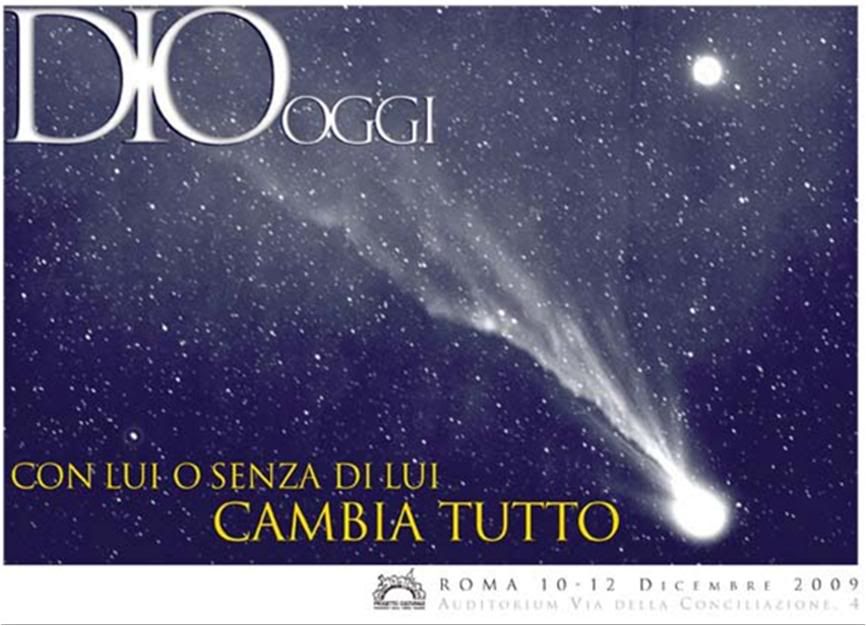 'GOD TODAY: With him or without him: it changes everything'
'GOD TODAY: With him or without him: it changes everything'
The conference will not be narrowly focused on the Church. It will range from philosophy to theology, from art to music, from literature to science.
And the speakers will be of absolute international prominence in their respective fields: whether Catholic or not, believers or agnostics, from Robert Spaemann to Aharon Appelfeld, from Roger Scruton to Rémi Brague, from Martin Nowak to Peter van Inwagen.
Nor will it be a parade of contrasting opinions, much less a sort of "forum for nonbelievers" of the kind organized years ago by Cardinal Carlo Maria Martini.
The objective is clear. It is aimed squarely at highlighting that "priority" which for Benedict XVI "stands above all the rest," at a time when "in vast areas of the world the faith is in danger of dying out like a flame which no longer has fuel."
The priority – as Papa Ratzinger wrote in his letter to bishops dated March 10, 2009 – is "to make God present in this world and to show men and women the way to God. Not just any god, but the God who spoke on Sinai; to that God whose face we recognize in a love which presses 'to the end' – in Jesus Christ, crucified and risen."
A conference of this magnitude is an absolute first for the Italian bishops' conference. It is one of the highest expressions of the "cultural project" that Ruini conceived.
Because this project is none other than "an effort to transform the Church's message for popular culture," as the rector of the Catholic University of Milan, Lorenzo Ornaghi, said in commenting on the book by Ruini and Galli della Loggia. An effort that has had, and still has, one of its most important platforms in Avvenire.
But it's time to let the cardinal speak.
A positive secularism for the future
by Cardinal Camillo Ruini
Secularism ["laicità"] is one of the great issues that has been discussed for years with seemingly inexhaustible interest. For this reason, it is difficult to propose "innovative ideas" concerning it, as we hope do in this encounter.
In relation to the emergence of something new, I would like to point out in the first place the risk inherent in the word "laicità," not in itself, but because, in Italian cultural and political discussion, it tends to reflect its descent from the French term "laicité," which historically has carried a fairly precise meaning - one that, in my view, is rather narrow, compared to the current problems as well as the influence of the other strand, which for the sake of clarity we will call "North American."
In order that a "new" secularism may be formed conceptually, and above all, that it may take shape in reality, the American foundation seems to me much more useful than the French one.
But first, one must take serious stock of the prominence taken on by the presence of the different religions on the public stage, in addition to the questions posed both by the transformation of customs and lifestyles and by scientific and technological developments, particularly in the field of biotechnology.
I also feel it is important to add a consideration that is not ordinarily talked about, but seems indispensable to me for a correct or intellectually honest framing of the entire issue of secularism and the public role of religion.
This consideration is contained in the subtitle of the international conference on God, organized for next December [in Rome] by the committee for the Cultural Project [of the Italian bishops' conference]: "With Him or without Him, that changes everything."
In 2001, Robert Spaemann illustrated in a very cursory but masterful way the meaning of this statement, specifying that the answer to the question: Does it make any difference whether God exists or not? profoundly changes depending on whether it is given by believers or nonbelievers, by atheists or agnostics.
Authentic believers answer that the difference not only exists, but it is great and radical – in fact, it is the first and greatest – concerning both the manner of understanding reality and the orientation to be given to our lives: for them, in fact, God is the origin, the meaning, and the end of man and the universe.
Nonbelievers, on the other hand, may respond differently depending on whether they believe that faith in God is negative, positive, or irrelevant for the life of man and of society. But in teh strict sense, they are referring only to our belief in God, not to the actual reality of God, since according to them God does not exist, or in any case, we cannot know anything about him, not even whether or not he exists.
Recognition of this profound difference of approach between believers and nonbelievers clears the field of misunderstandings of false uniformity, but it does not at all imply the impossibility of coming together on concrete objectives that are not only important, but, under the current historical circumstances, essential. I will point out some of these later.
Returning to the question of secularism, I would distinguish between the aspects about which there is substantial agreement today, even if it is often obscured by opportunistic controversies, and the points on which disagreement is profound, and even tending to deepen.
Following on the one hand the entry "Laicismo" edited by Giovanni Fornero in the third edition of the Dizionario di filosofia from Abbagnano, and on the other the documents Gaudium et Spes and Dignitatis Humanae from the Second Vatican Council, we can identify the aspects on which there is agreement, above all on the principle of the autonomy of human activities, meaning they develop according to rules that are their own, not imposed on them from the outside.
Behind this agreement, there also remain the differences between believers and nonbelievers - with believers saying that this autonomy has its origin and ultimate condition for legitimacy in God the creator (Gaudium et Spes 36).
A second element of agreement is constituted, despite appearances to the contrary, by the affirmation of religious freedom as an unalienable right of every person, and, at least according to the Catholic Church, of every community.
Decisive in this regard was the work carried out by Vatican II with the declaration Dignitatis Humanae, compared to the Church's previous positions on this matter. But compared to the widespread view in the secular world about the ultimate foundation of this freedom, the Council intended it to exclude a relativistic approach incompatible with Christianity's claim of truth.
I would add that Dignitatis Humanae (no. 7) clearly states that the freedom of man in society must be recognized in the broadest way possible, limiting it only if and as much as necessary. (No. 7)
On the basis of the two shared principles of the autonomy of human activities and freedom, particularly religious freedom, there is also widespread consensus – again, contrary to appearances – on the basic norms or criteria that should regulate relations between the state and religious communities, including those between the state and the Church in Italy.
In concrete terms, this refers to their distinction from each other and their reciprocal autonomy, as well as the pluralistic openness of the structure of the democratic and liberal state to the most diverse positions – including those of a religious and confessional nature – all of which have equal rights and equal dignity before the state.
The reasons for this openness and its dimensions are, however, fairly diverse, according to the viewpoint of the other side, as we will soon see.
The obstacle in Italy, which still survives to a certain extent in other countries, even in Europe, was that of a 'state religion', but this was institutionally overcome with the agreement in 1984 to revise the Concordat 'between the Vatican and the state of Italy]. The protocol added to Article 1 states: "The principle originally recalled in the Lateran Pacts, of the Catholic religion as the only religion of the Italian state, is considered to be no longer in effect."
As everyone knows, the basis for this revision was twofold - the Constitution of the Republic of Italy, on the one hand, and Vatican-II with its recognition of religious freedom on the other.
The objection that the very existence of the 1929 Concordat represented a privilege, contrary to the principle of the pluralistic and equal openness of the state to different religious confessions and cultural positions, did not seem insuperable after the revised agreement.
Concrete relations between a state and the different religious confessions present in the social body cannot, in fact, fail to take history into account, according to which the state may recognize a public character, and not only a private one, for the various confessions, with the concrete effects that follow from such recognition.
As for the aspects of secularism about which there are profound divergences - evident in the problems that have opened up in our time - these are mainly focused, in the liberal democracies to which I will limit my remarks, on the public role that religion can or cannot exercise, and on the conditions under which it can possibly exercise it.
The spectrum of opinions and positions in this regard is broad and varied, but it seems possible to identify two basic orientations, or, I would say, two sensibilities.
One of these tends to reduce the public role of religion, sometimes even to the point of suppressing it, justifies itself by emphasizing, on the one hand, the personal, spiritual, and intimate character, rather than social and institutional, of authentic religiosity; and on the other hand favoring, in the life of a nation, the properly political sphere over the social.
The other orientation tends instead to favor, or in any case to accept without mental reservations, the public role of religion, maintaining also that the social and institutional dimensions are essential for religion, and insisting on the autonomy and irreducible relevance of the social sphere.
It must be clearly stated here that these differences of orientation today appear tangential compared to the distinction, which is commonly made in Italy, between Catholics and secularists, as also between believers and nonbelievers.
Among Catholics, in fact, there are not a few supporters of a practice of religion concentrated on its spiritual aspect, who are quick to criticize the public role of religion and of Catholicism in particular, while among the secularists, especially after the emergence of the new and great ethical and anthropological questions, and after the renewed presence of the non-Christian religions on the world stage, there are many who willingly acknowledge such a role, and often hope for it.
I will now try to present my point of view on this issue in summary form.
Religious phenomena - that is, all of the religions, evidently including Christianity - have no less standing than any other social reality or phenomenon to influence the public sphere, including the specifically political dimension.
Naturally, religions must do this with respect for the rules of democracy and the rule of law, or, to use terminology currently in vogue, "the procedures through which political decisions are formed and expressed".
There is therefore no reason to impose special conditions for religion to exercise a public role: for example, conditions concerning the rationality of its arguments.
In a democratic society, the decision of whether a way of arguing is rational - better yet, plausible and convincing - rests ultimately and solely on the judgment made by citizens collectively in the appropriate forums, usually electoral.
Finally, I would like to indicate the reasons why the public role of religion – in particular of Christianity – is important, and can render a positive service to the life of society.
In other words, I would like to indicate the practical reasons for that "healthy" or "positive" secularism of which Benedict XVI has spoken repeatedly, meaning that it is open to the fundamental ethical demands and the religious meaning that we bear within ourselves.
One fairly significant reason was pointed out by E.-W. Böckenförde years ago, in his classic essay on "The formation of the state as a process of secularization".
The secularized liberal state, in fact, lives according to presuppositions that it cannot guarantee by itself, and among these, as Hegel had maintained, a particular role seems to be played by the moral impulses and limitations arising from religion.
Very recently, Rémi Brague, in a commentary on "Faith and democracy" published in the magazine Aspenia in 2008, proposed an interesting, and in my view an essentially acceptable, updating of Böckenförde's thesis.
In the first place, he extended this thesis from the state to the man of today, who to a great extent has ceased believing in his own value, because of the tendency to reduce man himself to a phenomenon of nature and the total relativism that are at the basis of the current interpretations of secularism - contrary to the openness solicited by Benedict XVI.
It is man, therefore, and not only the state, who needs today – but, in my view, substantially always – a support that he is not capable of guaranteeing by himself.
In the second place, religion is not only, and not even primarily, a source of ethical impulses and limitations. Today, before establishing limits and boundaries, the task is to find reasons to live.
Precisely this has been, from the beginning, the function, or better yet, the mission most proper to Christianity: it, in fact, tells us first of all not "how" to live, but "why" to live, why to choose life, why to rejoice in it and why to transmit it.
The book Confini [Limits], as the subtitle makes clear, is an exercise of "dialogue about Christianity and the contemporary world," which seeks to explore the motivations and restore the concreteness of a secularism which is not hostile to Christianity, but on the contrary, draws much of its strength from it.
Professor Galli della Loggia and I, despite our different points of view, agree on identifying Christianity as an essential guardian of the humanistic inspiration of our civilization.
To give Cardinal Ruini his full due, I am re-posting the most unusual letter to him by Benedict XVI on the day he retired as Vicar for Rome last year. This post originally appeared in the PRF.
 Benedict XVI's tribute
Benedict XVI's tribute
to a retiring cardinal
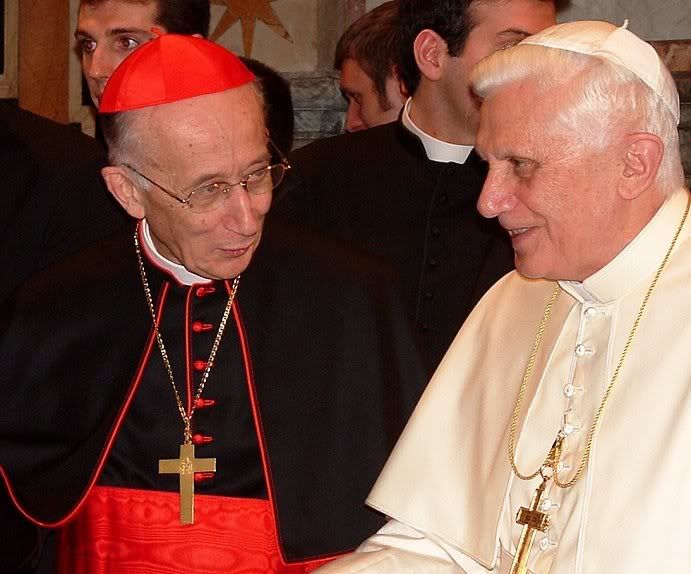 The Vatican today (6/22/08) published the full text of the Holy Father's letter to Cardinal Ruini, following the editorial about it. Here is a translation.
The Vatican today (6/22/08) published the full text of the Holy Father's letter to Cardinal Ruini, following the editorial about it. Here is a translation.
Venerated Brother
Cardinal CAMILLO RUINI
Vicar General for the Diocese of Rome
Twenty-five years have passed since that 29th of June, 1983, solemnity of Saints Peter and Paul, when in the Cathedral of Reggio Emilia, you received episcopal ordination with the imposition of hands by the late Bishop Mons. Gilberto Baroni.
You have praiseworthily chosen to celebrate this jubilee with priests of the Diocese of Rome who are also celebrating significant anniversaries this year.
Therefore, in this happy occasion, I wish to unite myself with you, dear and venerated brother, in giving thanks to God, recalling the stages of your fruitful episcopal ministry.
First of all, the first three years in your Diocese of Reggio Emilia-Guastalla, as Auxiliary Bishop, and titular to the ancient Church of Nepte. Having already been a well-known and respected priest to them, the faithful of Reggio Emilia and Guastalla rejoiced to see you as the primary collaborator of Mons. Baroni in the pastoral leadership of that Church, with the particular assignment of overseeing the formation and promotion of the lay apostolate and the celebration of a diocesan Synod whose theme was "The announcement of the Gospel today in Reggio and Guastalla".
In those years, you were also intensely committed to your work as vice president of the organizing committee for the national convention of the Italian Church that was to be held in Loreto.
Seeing in you a bishop who is faithful and wise, intelligent and far-sighted, my venerated predecessor John Paul II named you to be secretary-general of the Italian bishops conference (CEI) in 1986. Since then till March 7 last year, you have served the Italian episcopate uninterruptedly, particularly since 1991, when you became the president of the CEI.
As I had occasion to note in the letter I sent you on March 23, 2007, you have transmitted with courage and tenacity the magisterial and pastoral instructions of the Successor of Peter, showing great concern to help our brothers in order to receive them correctly and make them operational.
The reason above all which urges me to thank you at this time, Lord Cardinal, is your commitment in the service of the Church of Rome. It was on January 17, 1991, when the Servant of God John Paul II called you to succeed the late Cardinal Ugo Poletti, entrusting to you, as the beloved Pontiff wrote then, "that which is most my own and most dear to me: apostolic Rome, with its incomparable treasures of Christian spirituality and Catholic tradition; with its living strength in its priests, religious communities, and committed laymen, but also with its numberless human experiences, its thousand ferments, its materializations and its expectations."
He knew he would find in you "an expert collaborator who is trusted and generous" (ibid.), one who has known how to subordinate every other interest to the assiduous and affectionate care of the Diocese. You have offered the very same collaboration to me in these last three years.
In the Church of Rome, everyone could observe your great capacity for work, your simple and direct faith, your intelligent pastoral creativity, your faithfulness to the living identity of the Institution through union with the Pope even in the midst of difficulties, your trustful and smiling optimism.
Thus I extend to you, venerated brother, a fervent gratitude for all that you have done in this beloved Diocese. Above all, for having brought to fulfillment the diocesan Synod in 1993.
After the first phase led by your predecessor, you carried out the second stage, promoting the widest involvement of the parishes and all the other ecclesial entities present in the Urbe, particularly through the pre-synodal assemblies at the prefecture level, and through the initiative called 'Encounter with the City', working out an open dialog with the entire citizenry on the most important and complex problems of Rome today. Finally, you led the celebration of that Synod up to the publication of the Book of the Synod.
That book, which owes so much to you, continues to be relevant today to identify the ways suitable for favoring a real encounter with Christ in the areas of pastoral activity that the Church of Rome favors: the family, youth, social, economic and political responsibility, culture.
In order to carry out these pastoral indications, many occasions for reflection and dialog on the principal themes of faith and of pastoral programming continue to take place at the Basilica of St. John Lateran [the Cathedral of Rome]. I think, for instance of the 'Dialogs in the Cathedral' and to the annual church conventions, at which I have personally participated since I was called to Peter's Chair.
Among the commitments of these years of your episcopate in direct service to the Bishop of Rome, how can I not mention the preparation and celebration of the city's mission in preparation for the Great Jubilee of 2000? It was a mission in which the People of God were not only the beneficiaries but also its active protagonists.
Then, there was the Jubilee itself, whose high point was the 20th World Youth Day - an unforgettable experience for the universal Church, for which much is owed to the Diocese of Rome.
But one owes a special word of appreciation for your ordinary episcopal ministry. In the course of years, you have accompanied to ordination 484 diocesan priests, and have favored with various initiatives the establishment of 57 new parochial churches, of two subsidiary places of worship, and of the Church of the College of the Holy Korean Martyrs.
It is also thanks to you, Lord Cardinal, that numerous Catholic communities from other nations of the world have been able to have at their disposal in Rome a church for their celebrations and for keeping alive relationships among fellow countrymen and their lands of origin.
I wish to thank you, too, for what you have done for priests, deacons, religious men and women, seminarians, lay associations and all the People of God in the Diocese of Rome. In these years, the diocese has grown in communion and awareness of the urgency of mission.
In this respect, I must express to you my personal recognition of the dedication with which, during these years, you have introduced me to the complex reality of this beloved Church, accompanying me in my parochial visits, in encounters with the clergy, with the poor, with the sick, with the young.
Thank you for having supported my invitation for a serious commitment to education and for having convoked many times in St. Peter's Square so many faithful to listen, support and encourage the ministry of the Roman Pontiff.
In all these circumstances, you have been a faithful exemplar of your episcopal motto, "Veritas liberabit nos" - Truth frees us. In the name of this Truth, which is Christ himself, you have continually given yourself for the people of God who live in Rome.
For so many other services that you have rendered to the Church and to society in these 25 years of episcopate, one must thank you, venerated brother.
May the Lord, who knows the hearts of men, in particular, the joys and sufferings of pastors, reward you as only he knows, and continue to fill you with his gifts.
I entrust your beloved person to the Virgin Mary, Salus Popoli Romani, to St. Joseph, to the Apostles Peter and Paul, and to the virgin and martyr Agnes who watched over the years of your formation at the Almo Collegio Capranica and whose Basilica on via Nomentana you are the titular bishop.
With great affection, invoking a renewed outpouring of the Holy Spirit, I impart to you a special Apostolic Blessing, which I extend gladly to your family, to your co-workers and everyone dear to you.
From the Vatican
June 19, 2008


[Modificato da TERESA BENEDETTA 15/09/2009 15:03] |
| |
 01/10/2009 15:56 01/10/2009 15:56 |
|
| | | OFFLINE | | Post: 18.530
Post: 1.183 | Registrato il: 28/08/2005
Registrato il: 20/01/2009 | Administratore | Utente Veteran | |
|
 The Vatican bank has a new president
The Vatican bank has a new president
Ettore Gotti Tedeschi is a staunch proponent of a capitalism inspired by Christianity.
For him, a high birth rate is the main engine of the economy.

ROME, October 1, 2009 – At the same time when in Italy, between August and September, a dramatic ouster was underway for Dino Boffo, who headed the tri0media set-up owned by the Italian bishps conference (CEI), there were silent, subdued preparations for a change at the top of another key organization, the IOR, the Istituto per Opere Religiose (Institute for Works of Religion), better knwon as the Vatican bank.
The IOR itself is going through stormy times. A book describing its misconduct, with indisputable documentation, has for months been at the top of the best-seller lists. But in it, the villain is not so much the IOR as such, but its black sheep of former times, bishops Paul Marcinkus and Donato De Bonis.
The banker Angelo Caloia, president of the IOR over the past fourteen years, is instead depicted in the book as a knight in shining armor, the hero who kicked out the crooks, cleaned out the stalls, and brought a virtuous image back to the Pope's bank.
His resignation, and his replacement by Ettore Gotti Tedeschi, were announced on the morning of September 23, in a climate of peace and mutual esteem.
That same day, the executive board of the Italian bishops' conference – its thirty most prominent cardinals and bishops – started meeting in Rome for their autumn sessions behind closed doors to discuss many issues, including the successor to Boffo. But apparently, the meetings have failed to produce a consensus.
Boffo was much more than a media professional: he represented the "cultural project" of Cardinal Camillo Ruini as implemented in the field of communications - the bridge by which the Church's message became part of "popular culture."
Ruini was president of the CEI for sixteen years, from 1991 to 2007, and with him the Church had become a participant in the public sphere as never before. His project was the perfect application in Italy of the global vision of John Paul II.
With him gone, latent opposition to the Ruini leadership model gained strength among the bishops, the clergy, the Catholic laity, as well as in the Vatican secretariat of state. Boffo was there to hold the line of resistance, at the editor's desk of the newspaper Avvenire, at the television station Sat 2000, with the radio network InBlu,
Now that he is gone too, mowed down by Vittorio Feltri and Silvio [Paolo, the brother, not Silvio!] Berlusconi's Il Giornale, not to mention being sidelined by influential Catholics who were among his best writers, from Vittorio Messori to Giovanni Maria Vian, the latter being the editor of L'Osservatore Romano, the choice of his successor will also reveal the strategy of the Italian Catholic hierarchy for the future.
At the IOR it's a completely different tune. There the replacement has already taken place, and in full transparency, at the wishes of the secretariat of state and with the consent of Benedict XVI.
If Angelo Caloia revealed little about himself, made only rare public appearances, and kept his thoughts hidden, the exact opposite is the case with his successor as head of the Vatican bank. With Ettore Gotti Tedeschi, we know his life and legacy, friends and acquaintances, agenda and ideas.
His most recent appearance, before his appointment, was on September 19 at the Palazzo della Borsa in Genoa. Together with the archbishop of the city and president of the CEI, Cardinal Angelo Bagnasco, he discussed the encyclical Caritas in Veritate by Benedict XVI.
He said that the current global economic crisis "originated in the failure to follow the guidelines of Humanae Vitae, that is, in the rejection of life and the suppression of childbirth."
Gotti Tedeschi had expressed the same idea in an editorial in L'Osservatore Romano last June 6. If the economic hegemony of the world passes from the West to China, he wrote, it will be because of their different birth rates and population densities. Demographic trends determine the increase or decrease of an economy's productive capacity.
Gotti Tedeschi has five children, "all from the same mother," he specifies. He lives in the countryside of Piacenza, where he was born 64 years ago, in Pontenure, not from from the Po river.
He gets up very early in the morning, like a monk. In his BMW, he gets to Milan by dawn. He reads the newspapers in his office as president for Italy of Banco Santander, the biggest private bank in Europe, owned by a lay Spanish family, the Botíns. Then he goes to Mass, every morning, without fail.
He teaches financial ethics at the Catholic University of Milan. But he is also a board member of Banca San Paolo in Turin and of the Cassa Depositi e Prestiti, the operational wing of the treasury ministry.
On September 23, while the Vatican was making public his appointment as the new president of the IOR, Gotti Tedeschi was in Rome for a decisive meeting of the Cassa, to approve a 50 billion euro infrastructure and residential construction project.
The Cassa Depositi e Prestiti is the pet project of treasury minister Giulio Tremonti, for whom Gotti Tedeschi is an advisor "on economic, financial, and ethical problems in international systems," a post instituted specifically for him.
Before his appointment, Gotti Tedeschi had never set foot in the IOR, or even paid any attention to it. But he had already been at home at the Vatican for some time. Secretary of state Cardinal Tarcisio Bertone had asked for his help last year, to straighten out the financial management of the Vatican's central administration, which had a shortfall of more than 15 million euro in 2008.
The cure seems to have worked. The main culprit of the mismanagement, the secretary general of the administration, Bishop Renato Boccardo, was sent away to be bishop of Spoleto and Norcia. He had aspired to one of the top nunciature positions, and because of this had even turned down the See of Vienna. [How could he be considered for that, when he is Italian not Austrian? Did Magister perhaps mean the Nunciature in Vienna, which is not considered a top post? It was reported Boccardo wanted Paris.?]
In his place now is Carlo Maria Viganò, from Lombardy, who will soon rise to the highest position of the central administration, replacing Cardinal Giovanni Lajolo [as president of the Governatorate of Vatican City State].
Gotti Tedeschi was trained in the American McKinsey school of international finance. As a Catholic, he converted from "superficial" to fervent in the 1960s, under the spiritual direction of the traditionalist thinker Giovanni Cantoni.
The books that revealed his thought to the general public are Denaro e Paradiso [Money and Paradise]," published in 2004, with a preface by Cardinal Giovanni Battista Re, and Spiriti animali. La concorrenza giusta [Animal Spirits: The Right Kind of Competition]," published by Università Bocconi and with a preface by Alessandro Profumo, president of the largest Italian bank, Unicredit.
But after this there were other publications that were less prominent, but no less revealing. In 2007, Gotti Tedeschi, the most Catholic of bankers, signed an ultraliberal manifesto in 13 points, spearheaded by the former secretary of the highly secularist radical party, Daniele Capezzone.
The manifesto proposed a single 20 percent "flat tax," presidential government according to the American or French model, tax credits for health care and education, the requirement that the public administrator pay for all damages incurred, the changing of the retirement age to 65, tax exemption for overtime work, the abolition of professional associations and of the legal status of study certificates.
Years ago, Gotti Tedeschi proposed awarding the Nobel prize in economics to John Paul II, for his encyclical Centesimus Annus. More recently, he nominated Benedict XVI for Caritas in Veritate, which he participated in writing.
He also wished the Nobel prize for English prime minister Gordon Brown, for supporting his ambitious proposal in L'Osservatore Romano, "advantageous" for all, of investment in poor countries, on behalf of the two or three billion people who are only waiting to improve their lives.
The IOR seems too narrow for a new president with such vast and explosive proposals. But the adventure has just begun.
[Modificato da TERESA BENEDETTA 01/10/2009 15:58] |
| |
 20/10/2009 20:57 20/10/2009 20:57 |
|
| | | OFFLINE | | Post: 18.676
Post: 1.324 | Registrato il: 28/08/2005
Registrato il: 20/01/2009 | Administratore | Utente Veteran | |
|
 Our condolence to Mons. Georg Gaenswein for the unexpected death of his mother Gertrud. Let us pray for her eternal repose in God.
Our condolence to Mons. Georg Gaenswein for the unexpected death of his mother Gertrud. Let us pray for her eternal repose in God.
 Mons. Georg and his mother when he celebrated the Silver Jubilee of his ordination in his hometown last August.
Mons. Georg and his mother when he celebrated the Silver Jubilee of his ordination in his hometown last August.
It was his father who had been ailing since last year, and was even unable to attend this Mass. I have no other news yet except a brief item in AGI citing an OR report, but I have checked both the 10/19-10/20 issue and tomorrow's 10/21 issue, and do not see it, so it probably was not posted online. Will post as soon as I find out more.
P.S. Here's all I have found so far, from the Austrian Catholic news agency, and it's not all that informative:
Mother of Pope's secretary dies
I have no other news yet except a brief item in AGI citing an OR report, but I have checked both the 10/19-10/20 issue and tomorrow's 10/21 issue, and do not see it, so it probably was not posted online. Will post as soon as I find out more.
P.S. Here's all I have found so far, from the Austrian Catholic news agency, and it's not all that informative:
Mother of Pope's secretary dies

Freiburg, 20.10.2009 (Translated from KAP) - Gertrud Gänswein, mother of Mons. Georg Gänswein, Pope Benedict XVI's private secretary, died Tuesday morning. She was 78.
This was announced by the Archdiocese of Freiburg, to which the family belongs.
Last August, she took part in the celebration of her son's 25 years as a priest, in their hometown of Ridernam Wald in the Black Forest.
In June, she travelled to Rome with her other sons and daughters to attend the actual anniversary of Mons. Georg's ordination. At that time, she had a meeting with Pope Benedict XVI.
According to reports, her death was sudden and unexpected.
[Modificato da TERESA BENEDETTA 21/10/2009 02:12] |
| |
 21/10/2009 03:16 21/10/2009 03:16 |
|
| | | OFFLINE | | Post: 18.678
Post: 1.326 | Registrato il: 28/08/2005
Registrato il: 20/01/2009 | Administratore | Utente Veteran | |
|
 Sandro Magister on his blog calls attention to an interview Cardinal Angelo Bagnasco gave to Corriere della Sera on Sunday, Oct. 18, which I missed. It appears the Cardinal is standing his ground - and with good reason (he has the statute to back him up) - against Cardinal Bertone's avowed intention to take charge of the Church of Italy's political relations with the Italian government. An attempt, by the way, that Magister has always questioned.
The 'asymmetry' between the CEI
Sandro Magister on his blog calls attention to an interview Cardinal Angelo Bagnasco gave to Corriere della Sera on Sunday, Oct. 18, which I missed. It appears the Cardinal is standing his ground - and with good reason (he has the statute to back him up) - against Cardinal Bertone's avowed intention to take charge of the Church of Italy's political relations with the Italian government. An attempt, by the way, that Magister has always questioned.
The 'asymmetry' between the CEI
and the Vatican, according to Bagnasco

Oct. 20, 2009
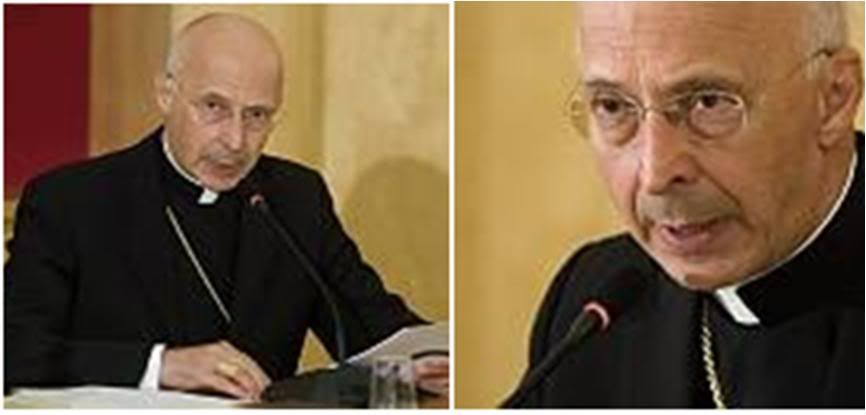
With his long interview on Sunday, October 18, in Corriere della Sera, Cardinal Angelo Bagnasco, Archbishop of Genoa and president of the Italian bishops' conference (CEI), has sent a precise memo across the Tiber, that is, to Vatican Secretary of state Cardinal Tarcisio Bertone. To tell him to stop trying to 'lead' the Italian bishops on political terrain.
There are no 'clashes' between the CEI and the Secretariat of State, Bagnasco insists. But 'a division of labor', yes. The two institutions are of a different nature, and therefore, the responsibilities pertaining to each are 'asymmetrical'.
Cardinal Bagnasco cites John Paul II's Apostolic Letter Apostolos Suos of May 21, 1998, which defines the theological and juridical nature of bishops' conferences:
"The CEI, like every other bishops' conference in the world," he said, "has the following responsibilities, according to the explicit instructions in Paragraph 15 of Apostolos Suos:
the promotion and guardianship of the faith and of customs, the translation of liturgical books, the promotion and formation of priestly vocations, setting up subsidies for catechesis, the promotion and custody of Catholic universities and other educational institutions, the ecumenical effort, relationships with civilian authorities; the defense of human life, peace and human rights, and to see that these are protected by civilian legislation, promotion of social justice, and the use of mass communications.
After that list, what remains for Bertone to do [insofar as the Church in Italy is concerned]? Simply the diplomatic side, according to Bagnasco.
"The work of the Holy See is different, and definitely with an international breadth, which is why the Secretariat of State is responsible on the diplomatic level for relations with individual states."
L’Osservatore Romano, reporting on the interview in its Monday-Tuesday double issue, omitted the parts cited above.
The 'asymmetry' claimed by Bagnasco also goes for other national bishops' conferences, not just the CEI.
That is why, for instance, the Spanish bishops conference looks to the CEI as a model, not to the Secretariat of State, to guide them in their pastoral activity in relation to the government.
For the mammoth demonstration last Saturday in Madrid, in defense of life in the womb and against a new law that would liberalize abortion excessively, the Spanish bishops allowed lay organizations to organize the event as an expression of civil society not limited to Catholics, but also including Jews and Muslims who condemn abortion.
The model was clearly the Family Day rally in Rome two years ago - in which the Italian Church, also allowing the demonstration to be organized by lay movements - was careful not to be seen as protesting the Prodi government's initiatives in isolation, but as part of a broad-based manifestation of all Italians.
[Modificato da TERESA BENEDETTA 21/10/2009 03:34] |
| |
 25/10/2009 19:16 25/10/2009 19:16 |
|
| | | OFFLINE | | Post: 18.714
Post: 1.362 | Registrato il: 28/08/2005
Registrato il: 20/01/2009 | Administratore | Utente Veteran | |
|
SAY A PRAYER:
FORMER CHIEF BODYGUARD
FOR JP2 AND B16 DIES at 83
Translated from

Oct. 25, 2009
Even if official protocol does not call for it, all of Vatican City state is in mourning today: Camillo Cibin, historic Chief of Vatican Gendarmerie (and therefore chief papal bodyguard), died today at age 83 in a Rome hospital.
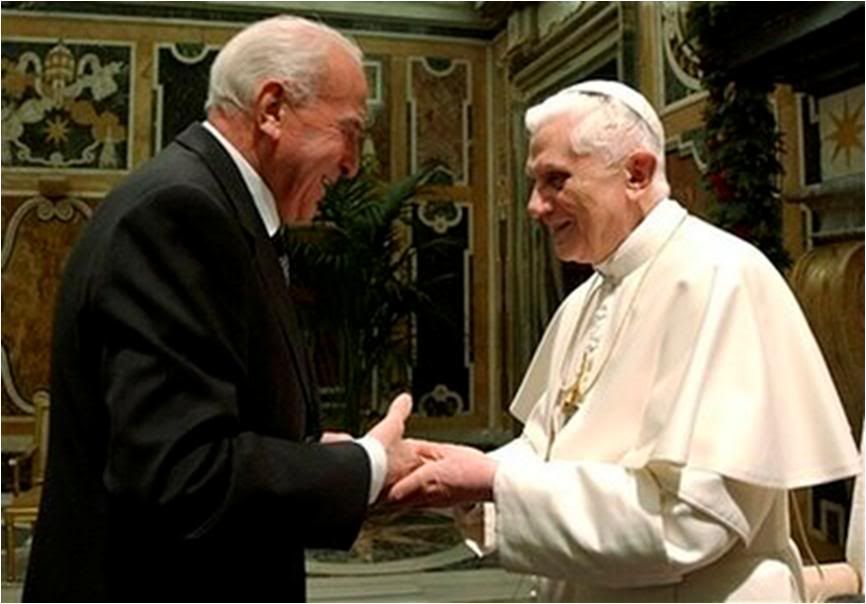
Cibin, shown above with Benedict XVI on Dec. 31, 2005, retired in 2006 when he turned 80, after 58 years of service.
He was John Paul II's bodyguard throughout his Pontificate and was near him during the attempted assassination in May 1981. He offered to resign then, but the Pope turned him down.
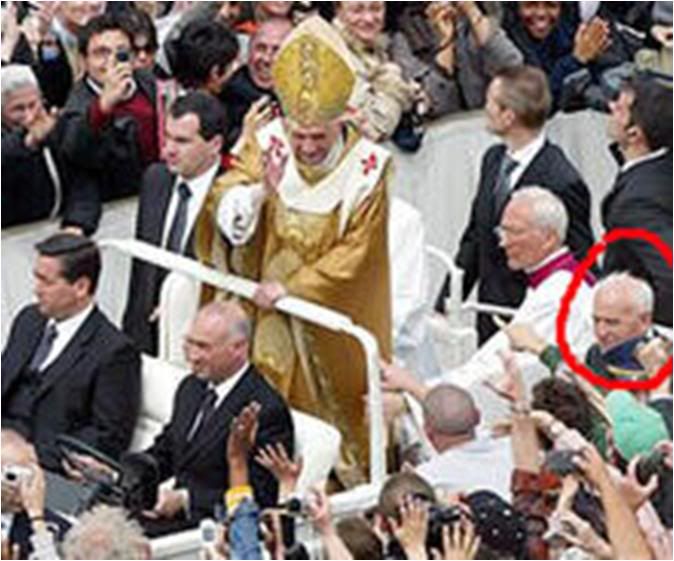 Cibin on duty on the day of Benedict XVI's installation Mass, above, and during a subsequent GA in St. Peter's Square (center, in photo).
Cibin on duty on the day of Benedict XVI's installation Mass, above, and during a subsequent GA in St. Peter's Square (center, in photo).
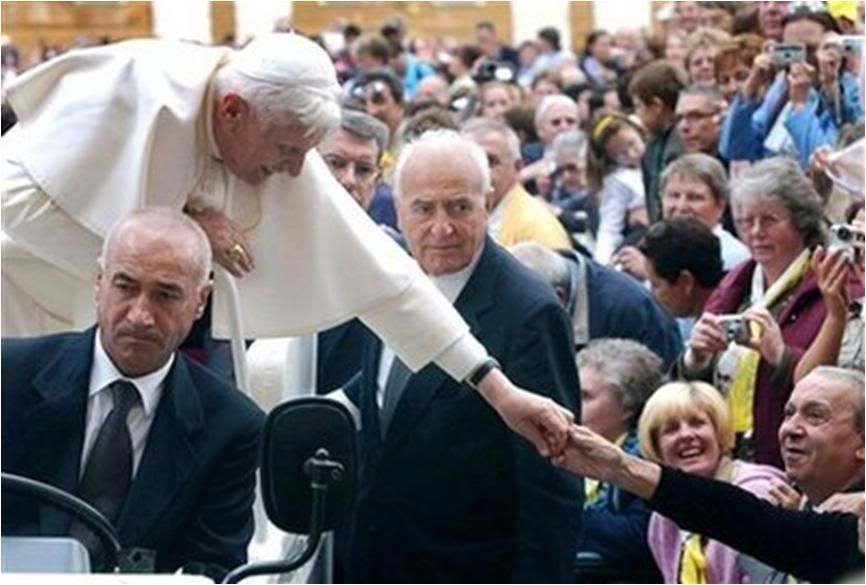
[Modificato da TERESA BENEDETTA 25/10/2009 23:03] |
| |
 25/10/2009 22:28 25/10/2009 22:28 |
|
| | | OFFLINE | | Post: 18.715
Post: 1.363 | Registrato il: 28/08/2005
Registrato il: 20/01/2009 | Administratore | Utente Veteran | |
|
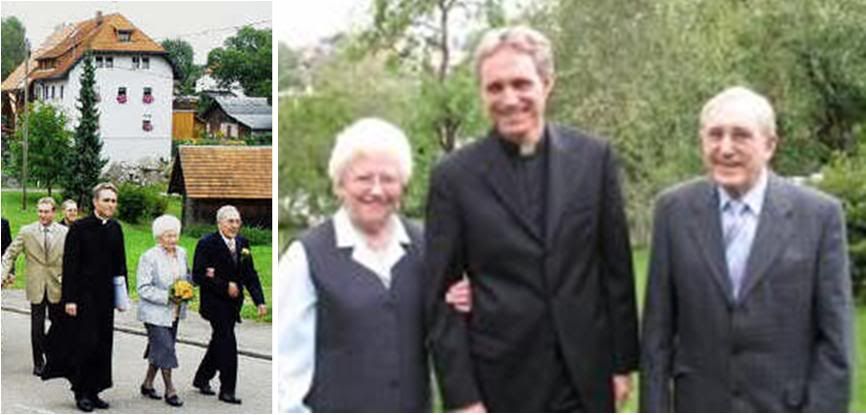 Mons. Gaenswein with his parents in happier times.
GG gives thanks for his Mom
Mons. Gaenswein with his parents in happier times.
GG gives thanks for his Mom
at funeral rite in Riedern
Translsted from

Oct. 25, 2009
I tried to go directly to the source Angela gives - the Suedkurier newspaper with local news from the Riedern am Wald hometown of Mons. Gaenswein, but the latest news they have online dates back to 10/21/09 when they reported briefly on his mother's death.
Last Friday, Mons. Georg Gaenswein celebrated the funeral Mass for his mother Gertrud in the same parish church which last August was the center of celebrations for the silver jubilee of his ordination as a priest.
Gertrud Gaenswein was very active in the parish of St. Leogar for more than 60 years, and her sudden death Tuesday at the age of 78 has certainly brought grief to the town of Ridern am Wald as much as to her family.
Speaking for his four siblings, the Pope's private secretary said, "It is very said to lose our mother so suddenly," but the children made sure that her last rites were marked by gratitude.
She had raised her children in love and faith. "For us she was a living model every day," her son said in tribute, and from her faith, she drew the strength to face difficult times, such as the serious illness of her husband, who has to be cared for in a nursing home.
"Her life and religious activities were the exterior form of what was within," her son continued, recalling how just a few months ago, she had celebrated with him, full of joy, at the very same church.
According to the regional newspaper Suedkurier, among the friends of Mons. Ganeswein who came from the Vatican for the funeral were Mons. Ettore Balestrato, underrsecretary to Mons. Mamberti for foreign relations, and Archbishop Mauro Piacenza.
Silence fell on the congregation when Benedict XVI's message of condolence was read. The Pope said he was struck by the sudden loss, recalling that he had met with her last July when her son marked the actual anniversary of his ordination with a Mass in one of the Vatican churches.
Here is what the Suedkurier reported on Oct. 21 about Mrs. Gaenswein's death, translated from the German:
Gertrud Gänswein, the mother of the Pope's private secretary Mons. Georg Gänswein, died unexpectedly yesterday, Oct. 20, in Rieder am Wald.
Her sister was visiting her because she had called to say she felt unwell. After a few minutes, she collapsed in her sister's arms, apparently of sudden heart failure. The emergency doctor could only pronounce her dead.
Last August, she had shared her prominent son's Silver Jubilee as a priest with great pride and joy.
|
| |
 28/10/2009 05:07 28/10/2009 05:07 |
|
| | | OFFLINE | | Post: 18.733
Post: 1.381 | Registrato il: 28/08/2005
Registrato il: 20/01/2009 | Administratore | Utente Veteran | |
|
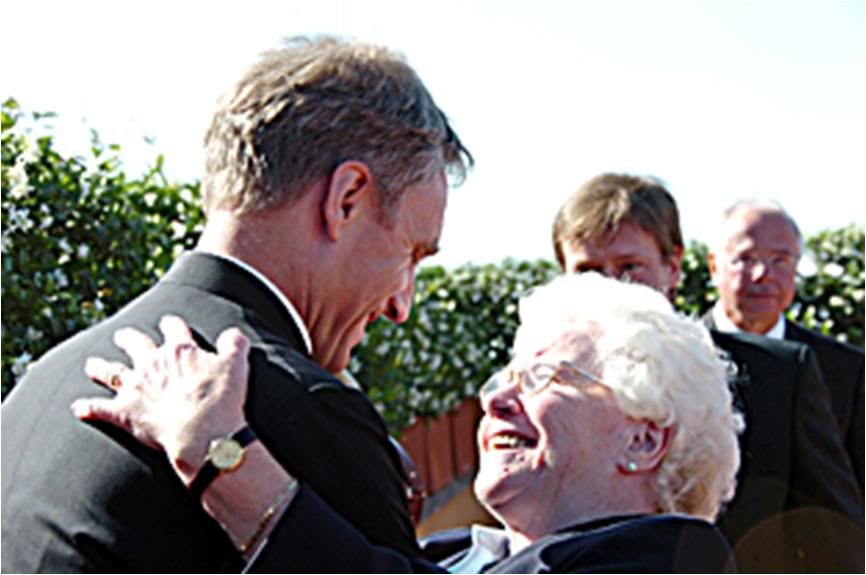 L'Osservatore Romano has this story and photograph in today's issue:
The funeral of Gertrud Gänswein
Translated from
L'Osservatore Romano has this story and photograph in today's issue:
The funeral of Gertrud Gänswein
Translated from
the 10/28/09 issue of

"I was profoundly struck upon learning of the sudden death of your beloved mother, Frau Gertrud. I still see her vividly before my eyes when we met a few months ago for the celebration of your Silver Jubilee as a priest, with her joy and her natural and direct mannere.
"It is difficult for all of us to believe that she is no longer with us. And once again, we are reminded that we do not know neither the place nor time when the Lord will call us to him. But we do know that we are always in God's hands."
With that letteer, benedict XVI wanted to show his nearness to his private secretary. Mons. Georg Gänswein, at the funeral of his mother who died unexpectedly on Tuesday, October 20.
The text of the papal letter was read by Mons. Wilfried König, chief of the German section in the Secretariat of State, at the end of the funeral rites celebrated on Friday, October 23, at the church of Sankt Leodegar in Riedern am Wald, Germany.
"It is truly very sad," Mons. Gänswein said in his homily, "to lose our mother so unexpectedly. It is almost impossible for me to formulate clear thoughts. Mind, heart and soul are all upset... (And yet) pain, suffering and sorrow cannot be the last word, should not be the last word... Rather, the final farewell must be a moment of gratitude, of immense gratitude from her five children towards our mother who was profoundly good."
"She gave birth to us and raised us in love and in the faith... It did not take a lot of words to bring us close to the faith - it was her personal example, the life she lived day after day, which was effective and convincing."
Her entire life of faith, he recalled, "was deeply anchored in her participation in the liturgical year whose mysteries permeated her flesh and blood, and in the many small signs, visible and invisible, of her devotions which were the irrenunciable elements of her daily life" - she frequented the sacraments and Mass, prayed the rosary, made an annual pilgrimage to the tomb of St. Nicholas of Flue in Switzerland.
There was also her commitment to a women's charitable association of which she was a founding member. And her son recalled his mother's participation in the parish choir, in which she sang for 63 years, up to the last Friday before her death.
And yet, he said, his mother's life "was not always full of sunshine", she was not spared "great challenges and difficult trials", but "from her faith, she drew strength and the certainty of overcoming problems and difficulties... because she had a firm faith in God, which made us all feel good and transmitted confidence" to those who knew her or met her.
"Meditating the Cross of Christ helped her to carry her own cross, but also to help others carry theirs. Her love for Christ flowered through the Cross.
"She was a lady with a joyful heart, and a kindness that conquered", who was always involved with others "gladly, out of conviction, out of choice, and out of love for her fellowmen... because she saw Jesus in others, not in a theoretical way, but concretely and practically".
That is why, he said, she also loved family celebrations, and all the small and grand events of Christian living.
"The good God asked a lot of our beloved mother, but also gave her much more. Knowing that gives us comfort and peace".
The entire town closed ranks about Mons. Gänswein and his sister and three brothers, with their attendance at Frau Gertrud's final rites.
Friends and colleagues from the Vatican also came to the funeral, among them, Monsignors Brian Wells, counselor at the Secretariat of State; Ettore Balestrero, under secretary for foreign relations; and Nicolas Henry Thevenin, one of the private secretaries to Cardinal Bertone; Fr. Hermann Geissler, chief of the doctrinal section in the Congregation for the Doctrine of the Faith; Domenico Giani, head of the Vatican Gendarmerie and the Pope's chief bodyguard; Daniel Rudolf Anrig, commandant of the Swiss Guard; along with Birgit Wansing, of the Schönstatt Movement [and Benedict XVI's longtime personal typist for his manuscripts and speeches) and Christine Felder of the Spiritual Family of The Work.
|
| |
 02/11/2009 00:10 02/11/2009 00:10 |
|
| | | OFFLINE | Post: 2.199
Post: 37 | Registrato il: 27/11/2005
Registrato il: 21/01/2009 | Utente Comunità | Utente Junior | |
|
Teresa: Thank you for this report, especially as I don't see L'Osservatore Romano unless I am in Rome. It's a very sensible, balanced report, the best I have seen yet. I feel sad for Monsignor Georg, but noted that he continued with his duties the day after his mother's death and then went home to celebrate her funeral Mass. He was back again the following week and I think this showed great fortitude in his time of grief. He's a good and loyal personal secretary to our Papa and doesn't deserve any of the criticism that has been hurled at him by the media. We simply should take no notice of these tabloid papers and disreputable magazines. |
| |
 18/11/2009 17:45 18/11/2009 17:45 |
|
| | | OFFLINE | | Post: 18.895
Post: 1.543 | Registrato il: 28/08/2005
Registrato il: 20/01/2009 | Administratore | Utente Veteran | |
|
Thanks to Sonny, who contributed this to Lella's blog
 The other Ratzinger
The other Ratzinger
and Otto the dog

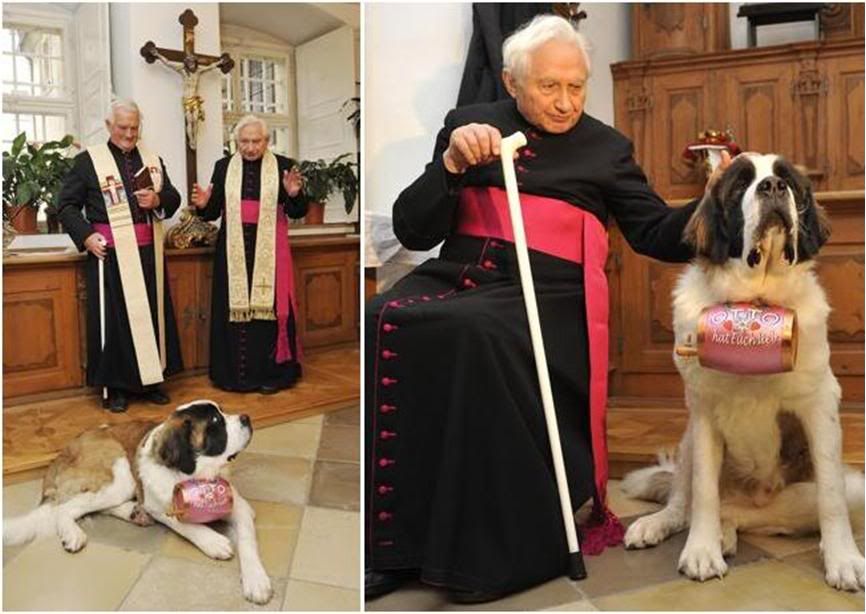
Georg Ratzinger, brother of Pope Benedict XVI, recently gave his blessing to Otto, a splendid St. Bernard who will be used as a 'catastrophe dog'.
The blessing took place in the old church of Regensburg.
Mons. Ratzinger said he was happy to take a part because the dog "will help people and make them happy".
Otto carries a barrel-shaped 'pendant' around his neck that says 'Otto loves you". (AFP)
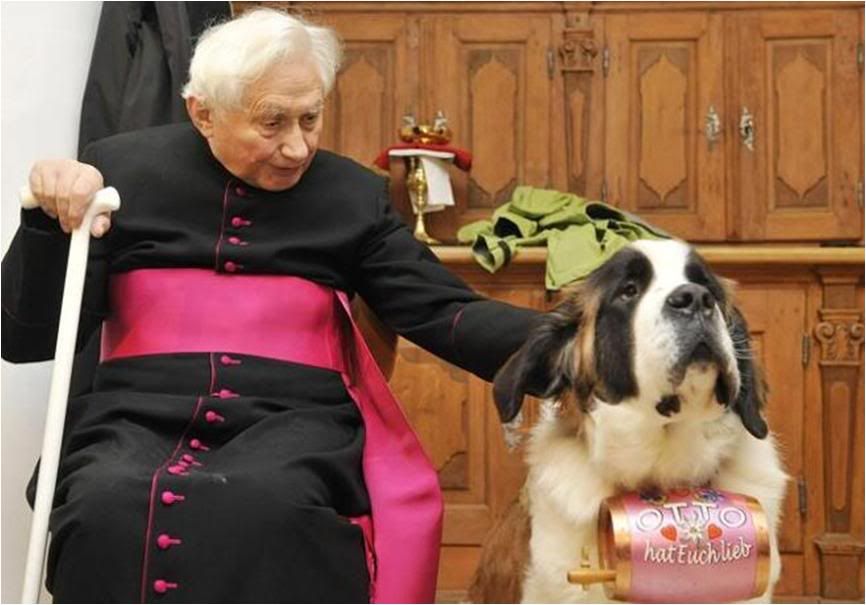 [Modificato da TERESA BENEDETTA 10/12/2009 20:46] |
| |
 31/01/2010 06:13 31/01/2010 06:13 |
|
| | | OFFLINE | | Post: 19.384
Post: 2.026 | Registrato il: 28/08/2005
Registrato il: 20/01/2009 | Administratore | Utente Veteran | |
|
A FRESH LOOK AT
CARDINAL BERTONE
As reported in the BENEDICT thread, on January 22, L'Osservatore Romano published the letter written by the Holy Father on January 15 confirming Cardinal Bertone as his Secretary of State after hE marked his 75th birthday earlier, the usual canonical retirement age. Here is the English translation of the letter.
To my venerated and dear brother
Cardinal Tarcisio Bertone
With the fine sensibility that distinguishes you, upon reaching your 75th birthday, you offered to resign as Secretary of State. I wish, first of all, to thank the Lord with you for the good achieved in the many years of your priestly and episcopal ministry.
In the present circumstances, it with great appreciation, indeed, that I recall the long road of our collaboration, which started with your work as a consultant to the Congregation for the Doctrine of the Faith.
I also have in mind the sensitive work that you carried out to set up dialog with Mons, Marcel Lefebvre, and I will never forget my visit to Vercelli [where Bertone was bishop] which became for me a renewed encounter with a great witness to the faith, St. Eusebius of Vercelli.
When you were called by my beloved predecessor to serve in the Roman Curia, you carried out with competence and generous dedication the office of Secretary of the Congregation for the Doctrine of the Faith.
Those were intense and demanding years during which documents of great doctrinal and disciplinary importance were born.
I have always admired your sensus fidei, your doctrinal and canonical preparation, and your humanitas which helped us a lot at the CDF to live in an atmosphere of authentic familiarity, coupled with a determined work discipline.
All these qualities were the reasons that made me decide in the summer of 2006 to name you as my Secretary of State, and are the reasons why today and in the future, I would not wish to do without your valuable collaboration.
I therefore desire at this time, Cardinal, to wish you every good, and prosperity in the Lord, invoking the abundance of divine grace on your ministry as my close co-worker.
In entrusting you to the special protection and intercession of Mary Help of Christians and of the Holy Apostles Peter and Paul, I impart from the heart, with the hope of abundant divine compensation, the Apostolic Blessing that I gladly extend to the persons who are dearest and nearest to you.
From the Vatican
January 15, 2010

Four days later, Luigi Accattoli wrote the following story:
Bertone: The Pope's alter ego
by Luigi Accattoli
Translated from

Jan. 26, 2010
The confirmation of Cardinal Bertone as Secretary of State did not surprise anyone, but nonetheless, it has a double significance which deserves to be examined: It confirms the moderate and very personal line followed by Pope Benedict XVI thus far in his governance of the Church, and it consolidates the Italian fallout of that governance in terms of a lightening of legislation-connected 'pressing' on the government.
I consider the Ratzinger-Bertone team-up fortunate because of the very different human types they represent. The Pope is s focused, reserved and rational as his Secretary of State is pragmatic, extrovert and improvisatory.
Thus Bertone can not only be with the Pope in his decisions, but he can also try to integrate it with his counsel.
Archbishop Tarcisio Bertone was for more than 7 years (1996-2003) Cardinal Ratzinger’s closest co-worker at the Congregation for the Doctrine of the Faith. Thanks to that experience, Benedict XVI chose him three and a half years ago to be his Secretary of State.
But the appreciation of Cardinal Ratzinger for his ‘gifts’ – that resulted in calling him to be his #2 man at the CDF - dates much earlier, when ‘don Bertone’ was just a consultant to the CDF. From 1988, in fact, when Cardinal Ratzinger named him to a group of experts who helped him in his negotiations with Archbishop Marcel Lefebvre.
The Pope recalled all this in his January 15 letter confirming Bertone in his position, in which he recalls ‘the long road together of our collaboration’, ‘the sensitive work that you carried out to help build the dialog with Mons. Marcel Lefebvre”, and even 'the visit to Vercelli which was, for me, the occasion for a renewed encounter with a great witness to the faith, St. Eusebius of Vercelli'.
We have no date for this last event, but we can imagine that having been named Archbishop of Vercelli in 1991, the enterprising Bertone would have invited the German cardinal who, even as a young professor, had studied Eusebius as one of the Fathers of the Church.
Finally, the Pope in his letter refers to the human warmth that characterizes Bertone, about which anyone who has met the latter even minimally would agree.
“I have always admired your sensus fidei, your doctrinal and canonical preparation and your humanitas which helped us a lot at the CDF to live in an atmosphere of authentic familiarity”.
A true Salesian, sports aficionado and music lover, gifted with a beautiful if untrained voice, Bertone is an atypical ecclesiastical figure. He is more informal, easier to speak to, and more accessible compared to the typical Italian cardinal. His speciality is canon law.
As CDF secretary, on Cardinal Ratzinger’s behest, he was in charge of the publication of the ‘third secret’ of Fatima in 2000 and of handling the Milingo case in 2002. It was known even then that the cardinal appreciated his practical sense, his ability to execute orders rapidly, and his simplicity in dealing with others. But even his jovial character endeared him to the future Pope.
The son of an organist father, Bertone is a passionate music lover. In his free time, he plays the piano and loves to sing. During the Milingo investigations, he once ended up singing at s dinner with the Zambian exorcist bishop, who is also famous for his songwriting, and who reported later, “Even Mons. Bertone ended up singing – he has a beautiful voice”.
I think that becoming Secretary of State to Benedict XVI was an astute turn of Providence, or of history, to pair the extrovert Bertone with the reserved Ratzinger, just as the prudent Cardinal Casaroli was paired with the daring Wojtyla.
Bertone’s views are complementary to those of Pope Benedict, so when the two agree on any decision, we can be sure that both sides of the coin have been well examined.
His presence at the Secretariat of State can be seen favorably by those in Italy who desire an evolution of the State-Church relationship towards greater reciprocal autonomy of the two entities. [But has that not been the situation since Italy's Christian Democrats disbanded in the 1980s and the Church 'lost' its 'home team' in Italian politics?]
Bertone has made his position clear that he thinks the relationship should be in the ‘diplomatic’ hands of the Vatican than in the ‘pastoral’ charge of the Italian bishops’ conference.
And so, as long as he is Secretary of State, we shall not feel the continual pressure of the Italian bishops on politics as there was in the years under Cardinal Ruini.
[Accattoli has obviously taken sides in the Bertone-CEI standoff. But Cardinal Bagnasco has not been less open and firm than Cardinal Ruini in articulating, on every possible occasion, the positions of the Italian Church on social and political issues that touch on pastoral concerns – including the touchy issue of how the government deals with immigrants, an issue that was not acute during the Ruini years.]
[Modificato da TERESA BENEDETTA 31/01/2010 06:16] |
| |
 24/03/2010 13:07 24/03/2010 13:07 |
|
| | | OFFLINE | Post: 14.834
Post: 4.078 | Registrato il: 17/06/2005
Registrato il: 18/01/2009 | Administratore Unico | Utente Master | |
|
Dear friends:
We need your signature! Please, click the link below:
http://www.soutienabenoitxvi.com/index.php?lang=uk
|
| |
 01/04/2010 15:34 01/04/2010 15:34 |
|
| | | OFFLINE | | Post: 19.814
Post: 2.456 | Registrato il: 28/08/2005
Registrato il: 20/01/2009 | Administratore | Utente Veteran | |
|
A strange way to sidestep the real issue here - which is media exploitation of a sex-plus-scandal-plus-Church formula to push their ideological agenda against the Church and the Pope. The same corruption and untruth would prevail in media reporting if Joaquin Navarro Valls were in Fr. Lombardi's place today.
Sex abuse: The Vatican's struggle
for Damage Control
By Jeff Israely in Rome

Wednesday, Mar. 31, 2010
For centuries, the papacy has operated with the conviction that it answers to no earthly power. Many in Rome still believe that to be the case, but nowadays the Church's faithful also believe in the sanctity of a free and vigorous press, with its unrelenting questions and nose for controversy. This all makes running modern media relations for the Vatican, in polite terms, a job from hell.
The current pedophile-priest scandal — what the Catholic writer and papal critic [and flamboyant homosexual - which is his chosen and determining identity] Andrew Sullivan pointedly refers to as "child rape" by clergy — has transfixed Catholics around the world, particularly with the allegations out of Germany that Benedict XVI, then Archbishop Joseph Ratzinger of Munich, may have allowed a transferred priest accused of sexual abuse to work again with children.
The scandal has had a telling effect on the tradition-bound Holy See. High-ranking clerics have complained of media bias and a conspiracy against the Pope.
One well-placed Vatican official who worked closely with the Pope when he was a Cardinal says "a sense of confusion" is spreading throughout the church hierarchy. "And the Pope himself is confused," the official says. "You can see it in his face. He is pained and saddened." [The most absurd statement ever, espectiall from a 'well-placed Vatican official'. When did Joseph Ratzinger ever show himself to be confused - in appearance, in words or in actions?]
But the person who must bear the brunt of the siege is not Benedict, who does not give press conferences. It is Father Federico Lombardi, the Vatican spokesman. An Italian Jesuit, he is credited with trying to bring the papacy into the 21st century, at least in terms of social media, setting up the Vatican's Twitter feed and YouTube channel.
Amid the current furor, Lombardi has, albeit in opaque Vaticanspeak, adopted a somewhat more engaged and cooperative stance with the media. On March 27, on Vatican Radio, he said, "The nature of the question is such as to attract the attention of the media, and the way in which the church deals with it is crucial for her moral credibility."
Lombardi acknowledged that the Church is often too suspicious and too slow to react to criticism. "We must be aware of the criteria under which the media react, the speed and the vastness, as well as the expectations for a response," he told TIME.
"We have been late in learning this within certain ecclesiastical quarters. Yes, there are problems with some of the [news] reports, but we shouldn't see it as a conspiracy or part of some calculated attack." [BS! Lomardi is trying to 'make nice' - it's all too clear that the attacks on Benedict XVI have been at the very least calculated, and even if they are not part of a formal conspiracy, they constitute part oa liberal strategy to exclude religion - particularly the Catholic Church - from the public discourse.]
The trouble is that within the Vatican, the lines of communication are more constricted than ever. Benedict holds far fewer face-to-face meetings than did John Paul II. Lombardi succeeded Joaquín Navarro-Valls, a dashing Spanish layman and former psychiatrist who enjoyed a close personal relationship with John Paul. Lombardi does not appear to enjoy the same intimacy with the current Pontiff.
Asked about their interactions since the latest series of scandals began to spread across Europe, Lombardi said he consulted with Benedict on the text of the Pope's March 20 letter on sex abuse to the Irish faithful. Otherwise, he has had no direct conversations with the Pope about the spiraling crisis.
Lombardi says he does not want to "jump over" the established chain of command, which requires him to report to the office of the Secretary of State, Cardinal Tarcisio Bertone, the Vatican's No. 2 man and an exponent of the conspiracy-against-the-Pope perspective on the crisis. [Does Fr. Lombardi really think that if he picked up the phone to Mons. Gaenswein and told him he wanted to speak with the Pope that Ganeswein would tell him to "Go through Bertone"???? He should be more assertive when he has to be! Obviously, running to Bertone hasn't done anything atlll to make Vatican communications to the outside world any more effective! ]
During a 30-minute interview in his modest, book-cluttered office just off St. Peter's Square, Lombardi stuck to the official line about Ratzinger's role in the Munich transfer, saying "it was normal" that the assigning of priests — even those with serious problems — was handled by deputies without the knowledge of the Archbishop.
"I believe the communiqués from Munich are sufficient," he said, referring to the statements of the German church hierarchy.
The Pope's spokesman, who juggles his current responsibilities with his previous job of running Vatican radio and television services, understands the broader perspective of his work — and perhaps the limits of his ability to effect change.
Says Lombardi: "My role is to try to help the world to understand the reality of the Church, which is a very different entity than a typical multinational company or organization. Its character is that of a spiritual governance."
That kind of otherworldliness is fine. But, says a senior Vatican official, "you can only have so much insulation of the Pope from those on the front lines. The bureaucratic logic ends up blocking your message and only creates confusion in the end." [CRAP! If all these 'senior' and 'well-placed' Vatican officials so often quoted do exist, they should all be consigned to Dante's circle for yellow-livered craven sinners - along with journalists like Israely who are probably making up words to attribute - safely - to unnamed sources!]
[Modificato da TERESA BENEDETTA 01/04/2010 15:35] |
| |
|
|
|
|